
00 ✦ C0NTENTS ✦ RĀRANGI KŌRERO
✦ Etita The News ✦ Kawe Pūrongo
Editorial
05. Mite Mania: Capital Hall Under Scabies Siege 06. Christian Fringe Cult Reportedly Back on Campus 07. Fair Pay Agreements: What to Know 07. Hot Takes in the Hub
08. Candidate Kōrero: Julie Anne Genter
Arts & Culture ✦ Ahurea
10. Willis Lane: Twelve Meals, Four Critics, One Sitting—Ethan Manera
Features ✦ Ahuatanga
13. Would Jean-Paul Sartre like BeReal?—Billie Angus
14. Paddy Gower Just Wants to be a GC—Ethan Manera and Zoë Mills
16. Barbiecalism Discourse
18. Beep Beep, I Lack Boundaries—Phoebe Robertson
22. Big Data is Reading Your DMs—Tory Alberts
26. Fandoms, Fraud and Failure—Tom Vincent
About Us
8
Podcasts ✦ Kōnae Ipurangi
9
30.
Aunty Vic 31. Ngāi Tauira 32. Teaspoonie 33. Fruitsalad
7 Puzzles ✦ Panga
Salient is published by, but remains editorially independent from, the Victoria University of Wellington Students’ Association (VUWSA). Salient is funded in part by VUWSA through the Student Services Levy. Salient is a member of the Aotearoa Student Press Association (ASPA).
The views expressed in Salient do not necessarily reflect those of the Editors, VUWSA, or the University.
Complaints
Complaints regarding the material published in Salient should first be brought to the Editors in writing (editor@salient.org.nz). If not satisfied with the response, complaints should be directed to the Media Council (info@mediacouncil.org.nz).
Letters
Got opinions about what we publish? Send it to letters@salient.org.nz and we'll publish it.
Horoscopes ✦
Creative Space ✦ Auhua
Find Us
Twitter: @salientmagazine
Facebook: fb.com/salientmagazine

Instagram: @salientgram www.salient.org.nz
Salient Podcasts
Instagram: @salient_podcasts
11. KATHYJCUISINE: Putting Kelburn’s Culinary Creations to the Test—@kathyjcusine Contents
1
2
4
5 6
Columns ✦ Tīwae
2 ✦ Influence & Media
3
Catch us on:

The Unedited Session
Salient Podcasts
Editorial
Media is: Energy
Drink Discord Bros, Tinder Fish Guys, and NPC TikTok Girlies
You might notice something a little different about us in our editorial pic this week, and that’s because Maia and Fran have left the chat. Enter Frank, Mark, and their shared gf Alexa. Frank is a Discord bro sponsored by Monster who posts slightly concerning conspiracy rants on YouTube, Mark is your classic Tinder fish bogan who you should block at first message before he asks you out on a picnic-turned-hunting date, and Alexa, named after Amazon’s home assistant, is a TikTok girlie who makes crazy bank pretending to be an NPC on live.

Welcome to the ‘Influence and Media’ issue: our chance to dissect this hyper-connected and weird AF media world. As two Gen Z babies, we’ve grown up with the internet. We’ve witnessed multiple eras of social media: Facebook, created to be a university student hub, becoming a Boomer-heavy meme and rant space; funny videos on Vine about dropping croissants transformed into lip syncs on Musical.ly; and finally, the intensely personalised and somewhat political hub that is TikTok. Within the last 20 years, the core way we exchange information and connection has changed drastically. We’ve gone from newspapers to scrolling through #MeToo storytimes paired with Subway Surfers visuals on TikTok, or infographic slides on Instagram news pages. The way media operates is not as straightforward anymore, and we tell our stories though many different platforms.
As future journalist children, we loved magazines like Creme and Total Girl (and their free gifts). Instead of VuW: Meaningful Confessions, we got our hot tea from ‘Dolly Doctor’. Even then, we doubt the celebrity gossip we read in those pages was totally truthful.
The pipeline from commenter to influencer to media personality is stronger than ever before. Within the likedriven social media sphere, the individual audience member becomes a ‘citizen journalist’ with a very important role in the way information is shared and digested. A writer or documentary maker could spend hours researching and forming a story for an un-fact-checked hate comment to be what makes it go viral for unintended reasons.


The relationship between news media and social media is a two way street. We’re no stranger to following a news lead from a TikTok or Confessions post, but we don’t go as far as places like the Daily Mail, who literally write their sensationalist headlines straight from the latest viral influencer (with or without their permission). An interview clip from fringe student media can catch a politician out and sit front and centre in a story, like Scott Sheeran chatting unmoderated shit about fees free on the Salient Unedited Sessions, leaving Nicola Willis scrambling to clean it up. A simple picture can be blown up in the blink of an eye, with the response becoming the news story. For example, the mugshot of one former US President, which was quickly yassified and parodied by thousands (and he even jumped on the gag to make a $7 billion profit selling t-shirts).
Lately, we’ve been thinking about how we shouldn’t trust everything we see online, and it’s curious to realise that we’ve always been caught in the divide between fact and fiction. Traditional media is tasked with prioritising their truth (even if Daily Mail lets the rest down). Social media might be the core way we get our information, but we hope our print mag still has a place, if only to log off and run your hands through some ink and (hopefully) true stories.
This issue hard launches Salient’s food influencer era, with reviews of all the food at campus and the new Willis Lane complex. We’re chatting media with unwittingly famous media personality Paddy Gower, who started his journo career right here at Salient, writing for us back in 1998. We’d be remiss to not continue our extensive Barbie coverage, with responses to the highly-anticipated movie.
Tory discusses how scary the internet’s extensive and unnecessary tracking is, warning readers to turn off their Snap Maps. Tom tracks the downfall of Tumblr and the old-age of unfiltered social media back to the Fyre Festival of 2013, DashCon. Phoebe asks how we can create boundaries around the constant access anyone has to us via social media.
In the #BREAKINGNEWS section, there’s been an outbreak of scabies at Capital Hall (watch out breathers). The preachers bombarding students on campus *tell all* (by ignoring our emails). We see where the political parties stand on fair pay agreements. Finally, our Election 2023 coverage continues with ‘Candidate Kōrerō’, as we chat to Green Party candidate for Rongotai, Julie Anne Genter.
Signing off for the week,
Fran and Maia xoxo
Salient
3 Influence & Media ✦
01 ✦ EDITORIAL ✦ ETITA
is fuelled by:
4 ✦ Influence & Media 02 ✦ LETTERS ✦ PŪ ✦ By
Vernon for VUWSA✦ ✦ Spirituality NOMINATIONS NOMINATIONS OPEN NOW OPEN NOW EXECUTIVE VUWSA ELECTION 2024 Nominate yourself for the 2024 Student Exec Passionate about student issues and want to create change in your community? Nominations close at 4pm 11th September For nominations and election info, head online to: vuwsa.org.nz/vuwsa-elections APPLY! APPLY! APPLY! APPLY!
Daniel
Mite Mania : Capital Hall Under Scabies Siege
 Words by Ethan Manera (he/him)
Words by Ethan Manera (he/him)
Freshers have been left itching and scratching as an unwelcome guest has taken over VUW’s Capital Hall: an outbreak of the small skin burrowing mite commonly known as scabies.
Salient understands a small group of residents first noticed some unwelcome itches two weeks ago, and have since informed staff they were receiving treatment for scabies, causing mite hysteria throughout the hall.
A TikTok video filmed by a resident shows common rooms cordoned off with yellow and black safety tape and “do not enter” signs, as well as a printed out notice which was put under residents doors announcing “confirmed case of scabies in our hall”.
A Capital resident Salient spoke to said they are “not surprised” that that the hall has scabies as “its fucking disgusting” and “everyone is filthy”.
They said that residents were all asked to wash their sheets, which became an issue as “half the people in this hall don't know how to turn the washing machine on”.
“All the common spaces are getting heavily deep cleaned with intense chemicals to kill the skin nits,” the source confirmed.
They also raised concern about the timing of the outbreak, which occurred at the start of the mid-Tri break, saying, “we could be spreading it all over NZ”.

A spokesperson for the university has assured Salient that the situation is under control, with all known cases receiving treatment and advice from Mauri Ora Student Health. They said that the common rooms have since reopened and that the laundry facilities “only enable hot water washing to support our students in avoiding a range of communicative illnesses, including scabies.”
The World Health Organisation describes scabies as “a parasitic infestation caused by tiny mites that burrow into the skin and lay eggs, causing intense itching and a rash.” The pinhead sized mites are easily contagious in shared living environments but are not necessarily a sign of poor hygiene. The true number of cases within Capital Hall, known for its feral behaviour, is unknown.
5 Influence & Media ✦ News the 4th September 2023 Issue Nineteen 02 ✦ NEWS ✦ KAWE PŪRONGO KAWE PŪRONGO
Christian Fringe Cult Reportedly Back on Campus
Words by Zoë Mills (they/she)
Do you come to uni to escape the Cuba St preachers? Sorry to break it to you, but there’s been an influx of fringe religious groups approaching students on campus.
Last week, a post on the VUW: Meaningful Confessions page asked about a recent resurgence of on-campus preachers.
“What is up with the amount of bible preachers around campus at the moment? [...] I really don’t like being approached and made uncomfortable when I’m running on 4 hours sleep and an assignment was due yesterday […] This is a diverse campus and no one wants to be harassed”, the post read.
Other students responded with similar stories, detailing experiences about one group in particular. “Is it still the God mother girls? They were super common in 2018 and 2019, but disappeared during covid” one commenter wrote. “I cannot believe that this is still happening”.
‘God the Mother', ‘Elohim Academy’ or the ‘World Mission Society Church of God (WMSCOG)’ are a fringe Christian movement that emerged in South Korea in the 60’s. The movements core beliefs position co-founder Zahng Giljah as God the Mother, or “The Bride” of God, a concept taken from specific biblical verses.

The controversial group has been criticised for alleged ‘cult-like behaviours’ by ex members, such as being expected to separate themselves from non-church friends, and instances of financial and emotional manipulation from church leaders. Allegedly, members were also ranked against other members based on their recruitment rates, and shamed if a particular number was not met.
In 2021, Craccum reported that Elohim Academy were attempting to recruit students at the University of Auckland and at the University of Waikato. During the same year, a post was shared on r/wellington to give a ‘heads up’ that Elohim Academy was recruiting in Kilbirnie via door knocking.
Students have echoed similar stories of attempted recruitment from the group on VUW campus, with accounts of being approached by two young women, claiming they were travelling from South Korea, and being offered a business card with contact information for the church. However, Salient cannot confirm whether all of reported encounters were the from the WMSCOG.
Lucas*, a resident at Weir House in 2019, described a similar incident with an RA that was allegedly involved with the group. “I heard stories [from other residents] saying she had attempted to get others along to join her, and was even successful in getting one or two of them baptised.”
“She eventually started asking residents for money and loans to fund a trip for her to go to Korea. I think that was the last straw, however, as she was fired not long after that”.

Another student, Em, cited a similar experience from a few years ago. She was approached by two women at the entrance of Te Aro campus, who continued to follow her inside after she used her swipe card to enter. “I didn't feel like I could get away," Em told Salient. “[They were] showing me things about God the father and God the mother, and trying to get my phone number and name. I left very swiftly and ran away.”
The University confirmed they had been alerted to concerns in regard to non-university-affiliated religious groups operating on campus in recent years, of which included WMSCOG. There are currently 6 registered faith-based groups that operate on campus.
“Any concerns that are raised with us are taken seriously and groups that are unregistered as clubs are asked to leave”, the university told Salient. “No group with the name ‘World Mission Society Church of God’ or ‘God the Mother’' has applied for registration as a club.”
World Mission Society Church of God (WMSCOG) has been approached for comment.
*Names have been changed.
6 ✦ Te Taiao 02 ✦ NEWS ✦ KAWE PŪRONGO
Fair Pay Agreements: What to Know
 Words by Niamh Vaughan (she/her)
Words by Niamh Vaughan (she/her)
In November of last year, the Fair Pay Agreement Act passed its third reading in Parliament, supported by Labour, the Greens, and Te Pāti Māori.
Fair pay agreements (FPA) allow employees and unions to negotiate with employers on what a fair level of pay within an industry is.
Make Work Fair, a campaign backed by the New Zealand Council of Trade Unions, describe FPAs on their website as having the ability to ensure that “nobody in [an] industry can be paid less than the rate agreed. It’s like the minimum wage, but for a specific industry. This will be negotiated by unions and employers in that industry.”

Alongside pay, an FPA can ensure fairness of negotiations over leave, working hours, and health and safety.
Industries with FPAs in force include bus drivers, supermarkets, hospitality, and early childhood education.
Aidan Donoghue is a current VUW student who works part-time for the New Zealand Council of Trade Unions as the FPA organiser for Wellington. Previous to his current job, he did a four-year stint in hospitality, one of the industries green lit for FPA bargaining.

“Fair Pay Agreements are the biggest breakthrough in workers’ rights in 30 years, and are guaranteed to provide untold protection and benefits for all working class Kiwis, especially youth,” says Aidan.


The Labour Party stated in a press release as the bill passed that FPAs “will not only improve wages and working conditions, [they] will also encourage businesses to invest in training and level the playing field for employers trying to do the right thing.”
Neither ACT nor the National Party are in favour of the Fair Pay Agreement Act, believing that its implementation will harm the economy and that not all workers will want to engage in bargaining.
Paul Goldsmith, National’s Workplace Relations and Safety spokesperson stated, “Fair Pay Agreements will make New Zealand’s workplaces less agile and flexible and make all workers beholden to a union agenda. It will force employers and workers within a sector to bargain for minimum terms and conditions for all employees in that industry or occupation, regardless of whether or not they want to be included.”
Both National and ACT plan to repeal the act if elected into government later this year.
HOT TAKES
7 Influence & Media ✦ 02 ✦ NEWS ✦ KAWE PŪRONGO
Sophie (she/her)
If we had to start Wellington from scratch, what would you change?
Jack (he/him) I would make the roads make sense. It just feels like a mess, they’re so small. Widen them please.
I would probably not build the main part of university on a hill.
rid of all the wind because it’s really annoying. It gets in your hair. We need it gone.
Olivia (she/her) I would make it illegal to get an Americano for more than four dollars. It shouldn’t be six dollars or even $4.50.
ELECTION CANDIDATE KŌRERO
JULIE ANNE GENTER
Words by Maia Ingoe (she/her)
The Rongotai seat has been held by Labour since 1996. In the 2020 election, the Green Party received 23.58% of the party vote in the electorate, shadowing Labour's 52% dominance.

“National has no show in the electorate, the Greens have already been coming in second without trying,” Genter says.
Is this a serious two-ticks Green campaign? “Definitely,” said Genter. “We are throwing everything at winning the seat.”
Housing
One of Genter’s three top priorities is increasing affordable and sustainable housing. “One of the key focuses of the Greens is capping rents—so they can't grow so far—and investing in new, sustainable housing.”
Julie Anne Genter regularly braves the cold for a swim in the South Coast’s marine reserve, Taputeranga. “It’s really magic,” she says. So it was an easy choice to film a campaign video there— until a whale visited Island Bay the day of their filming, disrupting their plans. Genter wasn’t disappointed. There could not be a better sign, she thought, for a Green campaign than a whale visiting. She posted on Twitter: “This is basically an endorsement, right?”
A Green Party MP since 2011, this is the first time Genter has put her name forward for the Rongotai electorate, where she lives with her family. After current Rongotai MP Paul Eagle’s failed mayoralty run led him to bow out of the contest, Genter said “it made sense” for her to stand. “The fact that the incumbent Labour MP is not standing, it meant there was a real opportunity for the Greens, especially I think because [Rongotai is] a very progressive electorate.”
The Green Party policy is to prevent landlords and property managers from increasing rent above 3% annually, alongside introducing a rental warrant of fitness. “The private housing stock is in a dire state, and renters don't have enough protection. We have the Healthy Home Standards, but those aren't particularly effective and they’re not enforced well.” Genter said that fixing those standards were crucial to providing a “warm, dry, liveable environment”.
“In the interim, we need to build more.” To do this? Freeing up zoning and improving infrastructure to support high quality housing density.
While Genter owns her family house in Berhampore, she also had a brief stint as a landlord before selling her previous apartment. “I think we were good landlords, but we didn’t want to be landlords.”
Genter said “I would like, in my neighbourhood, more density done well”, highlighting that access to services and employment within neighbourhoods is important. “Just houses alone doesn't help people, because people need to be able to get to jobs and the shops and the dentist and the doctor and the early childhood centre and the kindergarten and, you know, you need to do it all.”
8 ✦ Influence & Media
VOTE! ELECTION ✦ CANDIDATE KŌRERO
23
Transport
Genter says that “buses have really languished”, despite Rongotai having the highest bus use in Aotearoa and the fourth highest bike use for commuting. “I think I can really help champion practical solutions that will mean more buses, better buses, light rail, and more options for people who want to use bikes and e-bikes to be able to get around safely.”
She is in support of a light rail corridor from Newtown to Island Bay and creating cycle lanes that prioritise the “safe and efficient movement of people”. “Bikes take way less space than cars. If you want to enable more people to move around the city at lower cost, bikes are a better way to do that than cars,” she said. As well as city routes such as that through Adelaide road, she’s in support of proposals that create cycle lanes through green spaces such as the town belt, such as that from Trails Wellington.
While she’s in support of Let’s Get Wellington Moving, she said the problem is “it’s still kind of focused on roadbased transport”, with projects such as a second Mount Victoria Tunnel and Basin Reserve improvements which are “hugely carbon and cost intensive”.
Instead, Genter promotes public transport solutions for the Eastern suburbs: buses, cycling, and ferries. Genter would support Wellington’s harbour ferry, East by West, to build a second electric ferry. She would also provide services to Miramar Wharf, alongside planned Seatoun Wharf services, as a quick improvement whilst light rail is under construction. “When you look at the differential and costs, like it's only about 20, maybe 30 million to make the wharf changes that would enable this very service to Miramar.”
The bus driver shortage, for Genter, goes back to the private ownership of bus operations, underfunding, and a lack of long-term planning by the last National government. But a lot of it comes back to affordability of housing. “We need more affordable housing in Wellington so that people like bus drivers, firefighters, and teachers, and other core essential workers can afford to live in their name in this community where they're working.”
Public Services
The third priority for Genter is public services, with the Green policy priorities of free dental care and a wealth tax to support funding public services.
“We have a lot of inequality in the electorate… there's renters, people in social housing, council housing, refugees who've been resettled, and there’s a lot of students who are basically living in poverty because we haven't properly supported them to study.”
Genter is in support of VUWSA’s Universal Study Wage for All campaign. The Greens’ guaranteed minimum income policy also offers a universal $385 allowance per week.
“Closing that gap in providing support and universal public services for everyone through a fairer tax system would be our priority, that I think would very much affect the entire electorate.”
The Green tax policy includes a tax-free bracket for the first $10k, a higher tax rate for earners over $180,000, and a wealth tax, in which the top 1% pay a 2.5% tax on assets over $4m for a couple or $2m for an individual. Genter notes this is a tax cut for 95% of New Zealanders.
The Greens’ wealth tax is ambitious, especially considering that a wealth tax and a capital gains tax has been ruled out by Chris Hipkins. To this, Genter says it’s up to voters—“Every vote we get helps us get more representation”—but that a Green majority government will happen one day: “I have no doubt.”
Climate Justice
“The Greens are a growing movement globally because of the challenges we're facing. Climate change is becoming so undeniable. And even though all the other parties talk about climate change, they don't have it in their DNA.”
Climate action is interlinked with housing and transport, Genter says. As for climate adaptation, she’s in support of nature-based solutions such as marine reserves and kelp forests to buffer against sea level rise.
✦ ✦

“I think Wellington has so much potential,” Genter says, but its growth is reliant on improving transport and housing. “If you get those things right, then everything else starts to fall into place.”
While her Labour and National opponents for the Rongotai seat are both “lovely people”, she says “inherently, those parties don’t really grasp the changes that are needed to deliver”.
Genter’s message to students? “Your vote is powerful.”
“I believe the Greens have the solutions for students and we'll have your back. But ultimately, the power will go to the people who show up.”
9 Te Taiao ✦ 02 ✦ NEWS ✦ KAWE PŪRONGO VOTE!
✦
Listen to the full interview on Salient's Unedited Sessions podcast! Influence & Media
WILLIS LANE
Twelve Meals, Four Critics, One Sitting
 Words by Ethan Manera (he/him)
Words by Ethan Manera (he/him)
Willis Lane flaunts itself as “an exceptional curation of bars and eateries” with an “eclectic ensemble of vendors, gourmet wonders, curious attractions, and interactive experiences”, but what makes it different from any other Wellington CBD food court? I pulled together a rag-tag team of hungry third-years to put this new establishment to the ultimate test.
We set out to try one meal from each of Willis Lane's 12 vendors, to see if this new eatery really lives up to the hype.

Disclosure: Willis Lane paid me back (bc cozzy livs), but had no control over what I wrote.
Red Lantern 6/10
We parked up in a comfortable booth at Red Lantern to try out their buffet of what they describe as “imaginative twists” on Chinese dishes. We got a $18 large plate and filled it with a combo of all they had to offer. The beauty of a buffet is your ability to load the boat until you get a dirty look from the staff. The szechuan chicken was an absolute stand out: good level of heat and perfectly cooked veggies. The fried rice: bland. The sweet and sour pork: average. Overall, it's a safe option. Chinese food catered to Pākehā taste buds.
Hot Like A Mexican 8/10
The first thing we noticed about Hot Like A Mexican was the steep price. Whether you wanted two tacos, one burrito, or the quesadilla, it would set you back about the same price as a five-pack of Wellington City Council rubbish bags. Additions, like guacamole, come at an extra price. Despite this, the chicken quesadilla was the finest quesadilla I've ever had, packed full of high quality, fresh ingredients, with a deliciously fiery salsa. They do lose points for not having any slushy margaritas available, despite being on the menu.
Nam Nam 6.5/10
Nam Nam promises authentic Vietnamese street food. We ordered the chicken fried rice and roast duck cuôn (rice paper rolls). The fried rice was tasty but not very flavourful—more of a side than a main. The cuôn was pleasantly refreshing, although we would have appreciated a bit more flavour from their famous roasted duck. Nam Nam is like a close friend’s flatmate: they're nice, but you wouldn't go out of your way to hang out. Enjoyable, but forgettable.
RUBY ETHAN
Downlow 9 / 10
At this point, Willis Lane was getting busy, but Downlow unfortunately was not. We ordered a double smashed cheeseburger, fries, and a chocolate thickshake which totaled $26. George considers himself something of a burger connoisseur, and in his words, “Downlow didn't disappoint.” The presentation was immaculate, and the burger was just as delightful: a plush bun, beef patty, fresh red onion, and a briney pickle. It’s what I imagine a real life Krabby Patty would taste like. The chips were perfectly seasoned, with a nice crinkle shape. The thickshake wasn't special. It was rather thin and had an artificial chocolate flavour. You can’t win ‘em all.
Crack Chicken 7/10
This much-hyped modern fried chicken joint is the latest creation of influential Auckland restaurateur David Lee. Drooling in anticipation, we went for the original fried chicken burger and fries. Our excitement soon turned to distress. The bottom bun was completely soggy with grotesque purple coleslaw discharge. As I tried to take my first bite, the structure of the burger crumbled. While the chicken itself was good, it was too large for the sodden bun, and the burger fell to pieces. The seasoned fries were bussin though.
10 ✦ Influence & Media
You would be forgiven for not noticing Wasabi Sushi if you power walked through Willis Lane really fast. I hope their rent is cheap. Ailish tried the prawn sushi and said it's “more fishy than one would expect”. The rice was incredibly sticky which helped each piece stay together nicely. The batter to prawn ratio was dubious, making the $14 price sting. One thing I appreciate about Wasabi Sushi is its unmatched convenience: the grab n go system means it’s perfect for any yo-pro trying to make the most of their short lunch break.
The questionable variety of food sloshing around in our stomachs was taking its toll. Ailish took one for the team and tried the prawn dim sum herself. As far as prawn dim sum goes, she said it was incredibly chewy, and rather wet, “which didn't get me excited”. Upon chewing the dumpling, Ailish reported something bizarrely crunchy.

At this point in our culinary endeavour we were struggling. The thought of a beefy roll covered in nuclear-yellow cheese elicited cold sweats. We got the classic beef cheesesteak with the ambiguous “cheese wiz”. The thing felt like one of those big UE Booms. The taste could only be described as very savoury. “If I was starving, this would go down a treat,” George uttered while going down on the cheesy hoagie. Rick provided perfect bulking if you're a gym bro.

“Chicken curry with roti”—a simple name which piqued my interest. Costing $16.90, with $4 for a side of rice, this curry was bussin. Perfect amount of heat and tremendously flavourful. It had hearty chunks of chicken and soft cubes of potato. We were also caught off guard by the blue rice. Turns out this is a Malaysian thing. Very cool.
The staff here were very nice. I’m actually unsure what is angry about this place at all. We ordered a chicken katsu donburi bowl. It was ready quickly and the presentation was fantastic. Salty and delectable chicken, a good amount of sauce, and the little side salad was appreciated. Ruby described it as “a really solid meal”. For $16.90, it's a little on the expensive side, but so is fucking everything these days.
I was really excited for Corso. It's by far the biggest restaurant in Willis Lane, offering six different pastas alongside antipasti, salad, and desserts. We mistakenly asked the staff what the best pasta was, and the kind gentleman suggested beef cheek ragu. Unfortunately, he was wrong. The pasta was disappointing. There was barely any sauce, just stray pieces of beef cheek strewn around the bowl. Taste wise, it was unimpressive. The tiramisu was a divine saving grace—creamy, sweet, velvety. I’ll be back, Corso, but I won't be asking your staff for advice next time.
We ordered a platter for one, which boasts the brisket, pulled pork, ribs, and BBQ smoked sausage, a bread roll, potato salad, and coleslaw. This clocked in at a mighty $35.90— highway robbery as far as I’m concerned. The rib (singular) was deliciously smokey and the brisket was beefy. George reckoned the sausage was an underdog, and the pulled pork was so doused in sauce it was unenjoyable. The sides were a non-event. Wilson BBQ was tasty, but the price made it unjustifiable. If you're a wealthy alpha-male type who loves a meaty treat, this would be ideal for you.
11 Influence & Media ✦
Wasabi Sushi 6/10 Rick’s Cheesesteaks 7.5 / 10 Angry Ramen 9/10 Wilson BBQ 6/10 Foo Du Dumplings5/10 Nyonya Malaysia 8/10 Corso Pastaria 6/10 GEORGE AILISH
Putting Kelburn’s Culinary Creations to the Test
Words by @kathyjcuisine (hall/food)
My fellow Katharine Jermyn Hall inmates will testify that good food is hard to come by, especially on a tight student budget. But at Kelburn, do you have to sell your belongings or your soul to get a feed? Last week, Salient let me out of the ‘KAJE’ on a heroic quest to splurge on some tertiary tucker. Was it a hit or completely shit?#CleanPlateClub
Wishbone :(
RIP. Gone but never forgotten.
Hunter Lounge 5 / 5
Margherita pizza and fries. Fresh basil? Go on. Perfect for sharing? You bet. Both crispy and fluffy? Get in my belly. If the university is financially collapsing before our eyes, hey, at least we have banging pizza.
Krishna Food 5/5
Served at a leisurely pace, the oft-underappreciated joint promises a hearty meal every time. I got the Krishna plate, and this reporter can confirm it is no KJ curry night affair. Packed with beany goodness and Caucasian-level spice, coming in at just $10, the portion size was perfect. Their house-made lemonade allows the citrus flavour to shine without being too bitter. Grab a plate, slow down, dig in. #CleanPlateClub
Nam D 4.5 / 5
I am begging you Kelburn sods to show this place some love! Shoved into an unloved corner of the Hub— always overstaffed, never overhyped—my expectations were low. But the $9 pork banh mi hit the fucking spot. I don’t know what they put in that sauce but I’ll take a bottle of the stuff. The crackling stuffed inside was a texture sensation. An under-three-minutes make time and wrapped up NY style, this much is true: if you forget your sammie from home, this is a sweet alternative.
Maki Mono 4.5/5
It’s just sushi lol. Eight fun-sized, tasty treats that coated my throat like a boat in a moat.
Milk & Honey 4.5/ 5
Salient succeeded in smuggling my fresher ass into the strictly postgrad diner and let me tell you: if you manage to sit through over three years of half-empty lectures and crippling debt, you can reward yourself with some slightlyabove-average $21 spaghetti pomodoro. While the tomato sauce was too sweet for my liking, you’ve got to respect their cheese game. Fresh mozzarella? Get out of here. The pasta was overcooked like hell, but the vibes were good and I’m not gonna have a cry about it. Paired with a $5.50 house ‘orange’ soda, which cooled me down after my trek up the hill and had minty flavours galore, my mouth was singing. I’m a fiend for well-presented cuisines and Milk and Honey got the expectations high for my other victims.
The Lab 4.25/
5
The Vic Books imposter tempted me with a chicken sammie ($12) and a salted caramel cookie ($4.50). The good: they don’t play about portions. This was a solid meal and it tasted fresh enough. The bad: the cookie had a bit too much baking soda odour for my palate, and the bap looked from the cabinet like it was packed with twice the chicken. Sneaky. The ugly: the bread was absolutely covered in flour, so good luck doing anything else for 15 minutes while eating that bad boy.
Louis’ 3.8 / 5
School tuck shop vibes. The hole-in-the-wall coffee stand’s friendly staff put me in a good mood after two shitty lectures. The $7 supermarket mince-and-cheese pie was hearty, if you managed to swallow the $3 mark-up. Heavy but flaky, it reminded me of those gas station bangers that you’re not sure have any actual beef content but eat anyway. The $5.50 ginger slice was just like Grandma used to make.
Subway 3.5 / 5
I always find it hard to criticise Subway, and firmly believe that Subway haters were not loved as children. My Brother in Christ, you made the sandwich. But the Kelburn store at 12 p.m. on a Tuesday is the ninth circle of hell: pumping with underfed students, with staff that look like they’d rather be anywhere else. I just wanted my footlong and wanted out. The sandwich itself was standard: the bread has no structure but somehow fills a black hole in your stomach, and the sauces come in clutch with a much-needed flavour hit. If a carb craving arises again, I’d raid the Kelburn Subway once more, no questions asked.
12 ✦ Influence & Media 03 ✦ ARTS & CULTURE ✦ AHUREA
KATHYJ CUISINE
Would Jean-Paul Sartre like
?
Words by Billie Angus (they/she)
Existentialism is not just your Sunday crisis at 3 a.m. It’s the weekend comedown: you have to go to work tomorrow, you’re out of frozen dumplings, you’re spiralling. Nothing matters, nothing has any meaning, you have no purpose. To the existentialists, this is great!
Existentialism is a popular philosophy, first coined in the 1940s. The internet is threatening to make existentialism dated and obsolete. So why not imagine how the existentialists themselves would use the internet?
French philosophers Simone de Beauvoir and Jean-Paul Sartre believed we’re born first and make up who we are later (oddly reminiscent of notable oil fracker RuPaul’s “We’re all born naked, and the rest is drag...”). We’re then consumed with the problem of trying to live authentically in a war-torn, ever-modernising world. Existentialism believes we should stop letting others tell us what we are and how to live, and fight for the rights for everyone to do the same.
Beauvoir believed authenticity was synonymous with freedom. Her magnum opus, The Second Sex (1949), detailed how women (gender, as a term, only started being used years later) were considered secondary to men. She believed only once we were truly free from the effects of the patriarchy would we be able to begin to live authentically. This was later extended to cover all forms of oppression, including, unfortunately, signing a petition to lower the age of consent in France, believing children should be free too. Whoops.
Sartre was an incredibly anxious man, and focused more on how others viewed him. His most famous example of the concept he coined “bad faith” comes from his book Being and Nothingness (1943), describing a waiter. Since the waiter’s movements are too precise, it’s almost as if he was playing a role, trying to convince himself he is a waiter, nothing more. Satre believes to avoid bad faith we need to accept everything we do is a choice we make.
These two are not the only existentialists, but they are the most famous, and their ideas are still relevant. Social media has become completely inauthentic. But can we fix it? How can we authentically use Instagram, Twitter (I refuse to call it X), or even BeReal?
1 . Authenticity is not synonymous with the absence of privacy.
Being authentic on Instagram doesn’t have to mean pictures of your sink filled with dirty dishes. Authenticity is not sharing every single aspect of your life with the public. I would encourage you to do the opposite. Social media wants you to post more so they can advertise to you more effectively. Existentialism encourages us to take our lives into our own hands, rather than blindly following what you’re told. You don’t “have to” post anything, and should feel okay keeping some things to yourself. Unfortunately, this means BeReal is off the table, as it forces you to post your environment at a specific time.
2 . Authenticity is not permission to be hateful.
Just because that’s what transphobes think, does not mean they should use their platform to share it. We can only be authentic once we’re free from oppression, and our social media platforms need to be free from it too. People like to use free speech as an excuse to be bigoted, but bigotry is a form of oppression, especially when it cultivates negative attitudes towards those trying to live their lives authentically. Think twice before responding to a transphobic Facebook post, as it further amplifies their voice. Try blocking it instead. Negativity thrives off of attention. Give it none.
3 . Authenticity is not marketed.
This one is more of my push for you to install ad-block on every single device you own. Beauvoir believed capitalism is a distraction that doesn’t allow us to be authentic. We’re bombarded with ads every moment of every day, telling us what to eat, wear, buy, and even think. How are you supposed to figure out what makes you your own person when you’re being sold an image of how you should be?
I never felt bad about my hairy legs until I saw one too many razor ads as a tween. We can never be truly authentic under social media sites plastering ads everywhere we look.
The existentialists would tell us to rebel. Forget about engagement, likes, and followers, and post about the stuff you find interesting or don’t post at all. Use platforms in the way you want, rather than the designated way the companies want you to make money. And please, for me at least, install ad-block.



13 Influence & Media ✦ 04 ✦ FEATURES ✦ AHUATANGA
PADDY GOWER JUST WANTS TO BE A GC

of tears in his eyes as he takes a look at one piece in particular: a double-page investigation into race relations in New Zealand media. “People can't see that I'm actually stroking [the article] at the moment, which is very weird,” he chuckled.
Since Gower’s student journo days at Salient, his career has constantly evolved. He’s gone from being a sports reporter, a NZ Herald crime reporter, political reporter, and 3 News political editor, to smoking cones on national TV and now hosting his own show, Paddy Gower Has Issues. “It was probably right in front of my face what my identity really was, and it was this kind of stuff, rather than walking around with shorts in winter and a rugby jersey on. That wasn't really my identity,” he said, referencing his time reporting from the rugby field.
Gower says that the move into documentary making gave him a chance to “push the boundaries” in a way that hasn't hasn't been seen before. His doco series Patrick Gower On: which tackles the “big issues” is what Gower is most proud of. “The documentaries show my personality, they show everything about me. And people can get into them [...] In my view, it's more accessible.”
Paddy Gower pulled up to the Student Union building in his old, red family wagon, greeting us with a firm handshake and a chipper smile. The NZ media heavyweight kindly squeezed in an hour of his day to come along to the Salient office, the place where it all began for Gower, and chat about media, politics, and how he got to where he is.
“The first stuff I had published under my name was right here in this building with this magazine. How good is that?”
Gower’s time at Salient as a sports columnist and contributor is heavily documented in the 1998 Salient archives, back when it was still a newspaper. We pulled out a couple of his articles for him to take a look at, and it’s the only time in our chat where at moments Paddy falls completely silent. He tells us that he's got a couple
What sets Gower apart as a journalist and a media personality, however, is his brutal honesty. While discussing his time working at the press gallery as a political reporter, Gower compared it to “doing a life sentence for murder” and says that he “wasted all of [his] 30s in that building”.
“It's a really brutal place that left me with a lot of problems”. One of these problems was Gower’s relationship with alcohol, which he recently explored in his documentary Paddy Gower On: Booze, admitting, “I was an alcoholic.” This type of blunt authenticity seems to be Gower’s superpower, which he says is key to a career in the media, and a place in the meme lexicon of Aoteroa. If there’s one thing that Paddy wants people to know, it’s that “This is the fucking news” was just a fucking skit.
“That changed my life, which is so random,” he says, but insists he isn't sick of people bringing it up. “People say ‘this is the fucking news’ to me, I shit you not, every day. [...] If I got sick of it, I’d have to move to a foreign country.”

04 ✦ FEATURES ✦ AHUATANGA
Words by Ethan Manera (he/him) and Zoë Mills (they/she)
GOWER
" BE A GC . DON'T BE A DICK . LEAVE YOUR EGO WHEREVER YOU CAN SHOVE THE BLOODY THING, AND CRACK ON . "
When asked about his love for profanity, Gower apologies for not saying “fuck” enough throughout our chat and assured us he does “swear a lot”. He says the only time he's sworn on live TV was last year at “the fucking Queen’s funeral”. After being surprised by Jacinda Ardern’s international popularity and not realising he was live on air, Gower said “fuck they do know her” into the microphone.
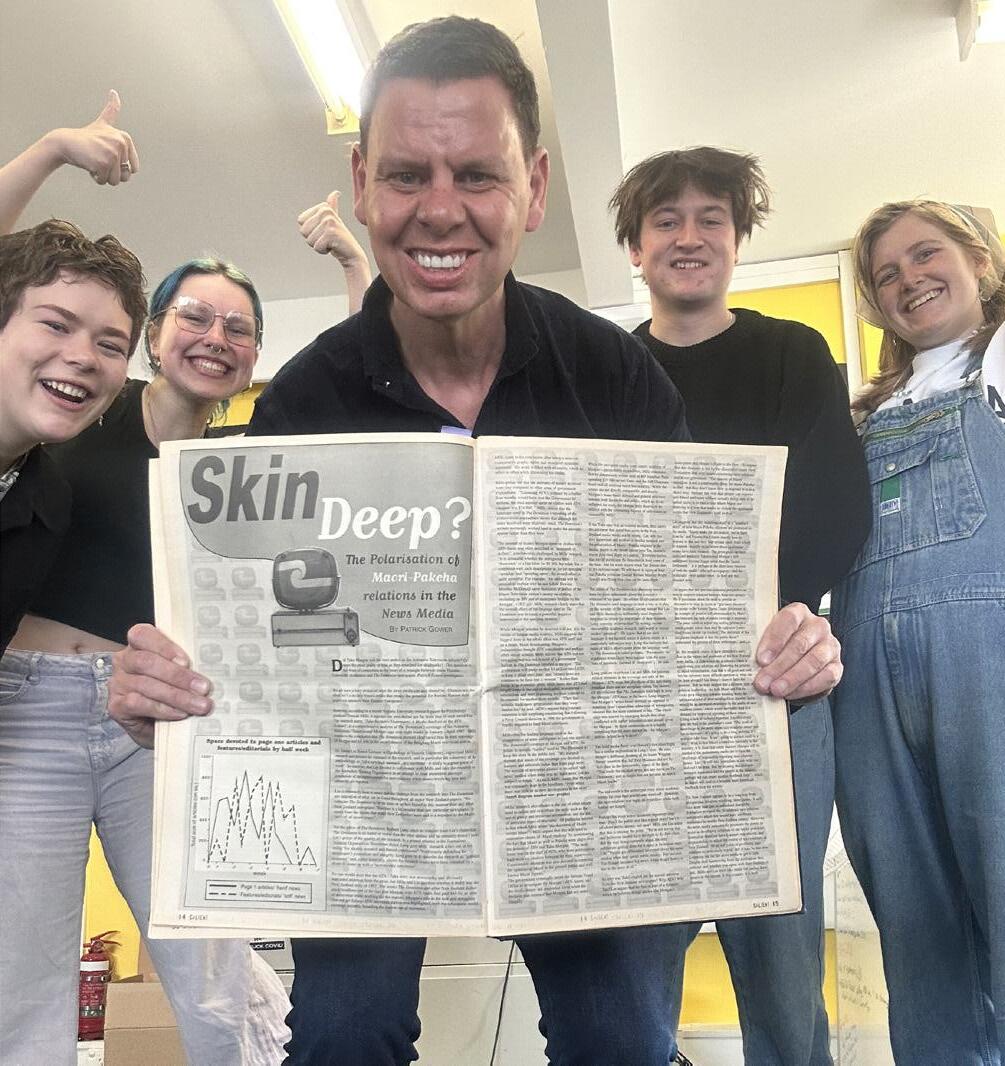
Although his days of political reporting are behind him, Gower was willing to share his reckons on the upcoming election, but admits what he has to say is “not the most exciting”. “It's gonna be pretty close,” he mused.
Somewhat more exciting are his takes on NZ First leader, Winston Peters. “It's too early to say whether he's back [in Parliament] or not, but as someone who has followed Winston Peters pretty bloody close down the years, [...] he's more than back in the game.”
Gower’s popularity in the mainstream media has also seen him gain influencer status on social media. He said he was “one of the first people to really get into Twitter” and has “always been interested in social media.” His TikTok account @matuapaddyg “just took off” after posting videos of himself sporting “speed dealer” sunglasses and sinking lion red on crate day. “I don't feel that great about that now, because [it] was, you know, sort of promoting binge drinking."
Paddy admits that his status led him into being a “bit of a fucking dick from time to time” and even “an egomaniac” at points. “I've had to sort of learn to work with that and just, you know, I really just want to be a GC,” he said. Although Gower agrees that there's a performance element to the world of broadcasting, he’s clear that “putting on a show” isn't for him. He finds that he’s become more “introverted” these days, to which he credits to getting older. “I do know that I am happiest
when I'm doing stuff like this,” he says, gesturing around the podcast studio. “Like at the moment, I'm having a lot of fun talking to you guys, which sort of shows that when I'm being myself, that's cool.”

It’s a sentiment that Gower comes back to multiple times throughout our chat—the importance of being himself and staying humble, wherever his work takes him.
“That's my vibe…[to] just be me. Be a GC. Don't be a dick. Leave your ego wherever you can shove the bloody thing, and crack on.”

04 ✦ FEATURES ✦ AHUATANGA
Listen to the full interview on Salient's Unedited Sessions podcast!
Paddy showing off one of his 1998 Salient articles.
The Editors LOVE
The Barbie movie was released into the world over a month ago, to fervent anticipation. The marketing (with a budget of $150 million) was unmatched, with brand deals, a soundtrack filled with pop legends, and a trailer that didn’t tell you anything about the plot. A major pop culture and media moment, Barbie catalysed a global conversation responding to the movie. Our TikTok FYPs were filled with videos responding to the movie’s feminism. Not to mention the Fox News-fuelled rage at its ‘wokeness’, which seemed very telling about the time we live in.
Fran :
I went to see Barbie twice, once with a bunch of straight cis men who left the cinema calling each other Ken and begged for a picture in front of the big ‘B’. Then, with my mum who talked through the whole thing, finding meaning within every sparkle.
As an avid Michael Cera lover, Alan brought me particular joy, and I agree with my fellow queers that he is trans-masc coded for sure. I did little teary giggles throughout the whole film. I don’t want to talk about the conservatives that hate Barbie, because they’re just incels, let’s be real—I wanna talk about the gays and girlies that are shitty with Barbie I think people are judging Barbie too hard. A lot of people seem to think that because it was a film that addressed feminism, it had to be a completely serious critical work of art. C’mon man, it’s a Barbie movie.
I think Sasha and her other Bratz are a perfect example of this type of energy. The dark, teenage vibe knows how distressing it is that humans have been living unequally for centuries, and despise a pretty, pink marketing scheme that is seemingly trying to fix it all. But that’s the joke, babes.
Yes, America Ferrera’s speech is very 2014 Tumblr, but unlike us Gen Z outcasts, the Boomers, Gen X, and the straights didn’t pay attention to any of that. I think the Barbie movie is
a perfect, light-hearted way to ease the absolute fuckery in this world filled with social constructions, contradictions, and double standards. All of Ferrera’s speech was true. I also love the realness of Barbie choosing reality, and when you think she’s about to girlboss her way to a job interview, she’s just going to the gynaecologist, *chefs kiss*.
Let Barbie speak to the Kens of the world. Sit back, relax, and enjoy the cute outfits and sweet moments that remind us of how much we love the AFAB people and women in our lives.
Maia :
Barbie brought me joy. Unlike those who claimed immediate emotional reactions to that final scene, mine was delayed. I did know I was happy that it was kind, comedic, and poignant.
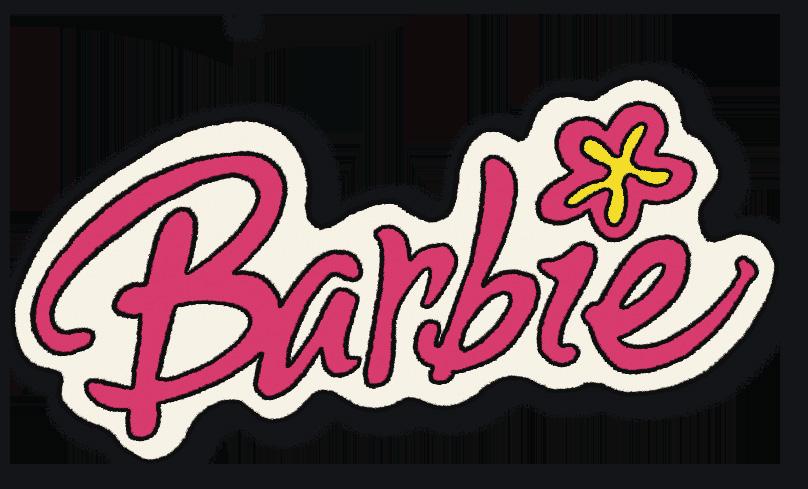
To me, the point of Barbie was a critique of Barbie herself. Like many young girls, I played for hours with those dolls at the behest of my mother who rightly thought Barbies gave young girls body image issues. In the movie, Barbie started with good intentions to show how women can be everything, a product of that hectic, never satisfied ‘have it all’ feminism we saw in the generation of women before us. Doing that, Barbie became a hidden tool of the patriarchy, telling girls to aim high, but to do it perfectly. This expectation is what we saw in our mothers’ generation: being caretakers of families whilst spearheading careers and never ageing. The constant juggling: a feeling of never doing enough.
The final point of Barbie is that you do not have to be perfect, to be enough. You can live a normal life—family, SUV, suburb—and still be enough. If you aren’t an astronaut, it doesn’t make you any less of a person.
My reaction to Barbie was to reflect on the women before me—the mothers, grandmothers, and aunts. Sneaking that message alongside comedic spoonfuls of sugar doesn’t hurt.
16 ✦ Influence & Media
04 ✦ FEATURES ✦ AHUATANGA
Words by Maia Ingoe (she/her) and Francesca Pietkiewicz (they/she)
BARBIE CALISM
A Critical Response to the Barbie Movie
Words by Zoe Hollier (she/her)
Allow me to take you back a month—an entire century in media-cycle time—to that pinkified period of Barbiecalism. As momentous as the moon landing and glittering as the Bronze Age, Barbie, a reformed cultural icon, tiptoed her perfectly arched foot into the capital of our minds and has thus far refused to leave. Her so-called ‘radical wokeism’ (in the words of personally afflicted conservative commentators) instigated an international conversation about womanhood that is infiltrating humanity’s digitised psyches across the globe.
We all relished our participation in this cultural moment, decked out in our finest pink garb to venerate director Greta Gerwig’s feminist manifesto; pleading with our boyfriends and besties to tag along; posting our pinky pics to our stories; consciously and subconsciously urging everybody to participate in the cultural phenomenon of Barbie
But we’ve got to ask ourselves: what is it we’re actually participating in and promoting? What are we all influencing each other to take part in? What might be hiding beneath the surface of Barbie’s blinding, glittering pinkness?
I didn’t like Barbie
I know, I know, hold the tomatoes. I think I must have watched a different movie to everyone else, because what I felt as the credits rolled was not emphatic femininity, but rather concern as to the deeper impacts this film will have on culture, discourse, and feminism as a whole.
You see, the film is outdated. It’s a repackaging of old feminist ideas shoved to the forefront of mainstream discourse, restating and reprioritising second-wave feminism against a modern backdrop. Yes, Barbie was an emblem of feminism— 50-odd years ago. Her whole deal is that “women can be anything” (a sentiment the film carries at its heart), which was a radical idea in the 1960s, but does not hold relevance to 21st century feminism.
There has been a cinematic trend of outdated feminism that I’ve noticed these past few years, and my concern only grows as Barbie’s influence continues to grow.

Remember last year’s craze over Don’t Worry Darling? The shitshow, white woman’s Get Out? Marketed as a modern feminist film, director Olivia Wilde noted the inspiration of Betty Friedan’s 1963 The Feminine Mystique —the book that sparked second-wave feminism—
and the 1970 film The Stepford Wives; two pieces of media from over 50 years ago. Radical for their time, they assert that women can be more than their prescribed role as the traditional housewife. Is that really a modern conversation? A film released in 2022, headlining issues 50 years its senior—is this really what modern-day feminism is?
Barbie does the same thing, parroting beginner feminism painted as ‘radical’ and resurrecting old fights to the forefront of media discourse. How many podcasts, opinion pieces (yes, I see the irony), and TikToks have you seen about this film? Feminists are having to reassert old conclusions to those outraged male conservatives just to get any hold of the immense influence this film is having on our mediated world (thanks Ben Shapiro).
What particularly got to me was America Ferrera’s monologue and the Barbies’ plan to ‘fix patriarchy’. While everyone else in the theatre cried, I was dumbfounded at the simplicity of the film’s culmination: if women only knew the reality of patriarchy, they could solve it and trick men into giving up their ruling dominance because girl power. Seriously? Is that the message of a film released in 2023? I thought we knew this shit already, and at a more complex level than that!
We must be critical of the media that influences us so we don’t continue to get caught in outdated conversation. Yes, feminism is an ongoing, cumulative process, but there are bigger, more pressing issues to be making headlines, beyond cis and heteronormative idealisations of pinkified, simplified, ‘feminist’ commodity.
Maybe I’m a bit upset that this is the standard of worldwide-blockbuster-feminist-filmmaking. I thought we were past this sympathetic, antiquated feminism where women spoonfeed men Feminism101 at snail’s pace, praying we may one day get to actually radical and modern fourth-wave feminist conversation.
17 Influence & Media ✦
04 ✦ FEATURES ✦ AHUATANGA
I LACK BOUNDRIES
When we discuss 'social media boundaries', the conversation usually centres on taking a break from our phones on Sundays, switching off notifications, and setting up apps to limit screen time. For me, there is something more concerning about the openness of self that comes with social media.

I can effortlessly connect with family and friends worldwide, just like teleportation. Conversations span continents, allowing me to chat with my English grandma or American uncle. Sharing photos and face-to-face moments is a breeze—an incredible privilege not available to past generations. The convenience of our hyper-online lives sometimes masks a lack of empathy. Having a constant online presence sets an expectation of instantaneous responses and constant activeness, leaving little room for understanding how our interactions are more complex than a heart-shaped reaction.
Recently, an Instagram account I follow, @softcore_trauma (run by Margeaux Feldman), posted their ‘social media boundaries’. In eight Instagram slides, they expressed their boundaries around interacting with their 300,000 followers. It’s a pinned post on their profile, and it got me thinking about my own boundaries with media.
They started the post by reaffirming that their page was a place for them to discuss their own “personal lived experiences” and that it was not supposed to offer generalised nuance. While this feels like it should go unsaid, Margeaux had to restate this boundary after receiving criticism that their posts did not relate to other people's experiences. Online, it is easy to forget that you are talking to an individual, especially if they run a business page.
18 ✦ Influence & Media
04 ✦ FEATURES ✦ AHUATANGA
Words by Phoebe Robertson (she/her)
Margeaux also mentioned that while they “will engage in criticism in good faith” they will delete comments that make blanket negative statements about their character or content. They make a really interesting point that in real life, “[they] can walk away when someone speaks to [them] unkindly. Online, the only resource [they] have is to block you. That is [their] boundary.”
Online figures are often criticised for blocking individuals from leaving negative comments or harmful speech. But I’d like to ask, why is this the case? There is the belief that we should have access to anyone's social media, especially celebrities and public figures. There is an innate desire to see their lives and be able to interact with them. But really, anyone should have autonomy in how they present themselves. Being able to block whom you want, for whatever reason, is an innate part of that.
In the tangible world, disengagement is a matter of walking away, but online, repercussions loom. The power to block or set profiles to private exists. Even so, the persistent reach of friends, bosses, and colleagues remains an ever-present force, demanding our digital presence.
At a previous job, I was required to check WhatsApp daily and promptly respond to any messages sent to me. Even when I had days off, I would still be messaged about work or expected to come in early. If I didn't reply immediately, it would result in a reprimand. This reflected the lack of consent our supervisors had towards us employees, as it didn't matter if we were at work or off the clock. The line between work and personal life was blurred by online access.
Similarly, when friends reach out over social media, there is often an unspoken expectation that you reply immediately. The issue with messaging apps is that conversations can easily become prolonged and timeconsuming, which can interfere with other tasks or unwind time in daily life. I personally can’t shake that sense of discomfort from knowing that others have constant access to me through social media platforms.
This discomfort is echoed through social media influencers. Bunny*, a TikTok influencer with over 100,000 followers, spoke to me about having to navigate their own online world. At the start of their career, they would engage with anyone who viewed their content and created a community with them. As their platform grew they expressed an “unsettlement” about the volume of people that suddenly had access to them.
Bunny’s DMs were often full of individuals messaging them about personal problems or relationship issues without asking for prior consent or warning. Due to this, Bunny had to release a public statement asking followers to not expect unpaid labour from them, or expect replies to every single message. At the time, Bunny tells me it was a “scary thing to do” as they were afraid they would “lose followers or create backlash” from simply setting boundaries with their followers.
A "surreal" moment for Bunny was being recognised from their content and approached by a stranger on the street. Looking back on the moment felt like “an almost melancholy experience— someone who I didn’t know had approached me, acted like they were friends and knew about me, and then walked off”, all without Bunny ever having met them before. Since the interaction, they have been wondering about setting more boundaries or asking followers not to approach them in person.
While we are all guilty of getting sucked into the world of online connectivity, I’m here to remind you that it’s okay to take a step back from your phone; to not open that text from your friend for days or leave your boss on read. We all need to work to create active boundaries and healthy relationships with our own online worlds. And we all need to learn to respect and give space to others—one diving line, or Instagram post, at a time.
*Names have been changed.
19 Influence & Media ✦
04 ✦ FEATURES ✦ AHUATANGA
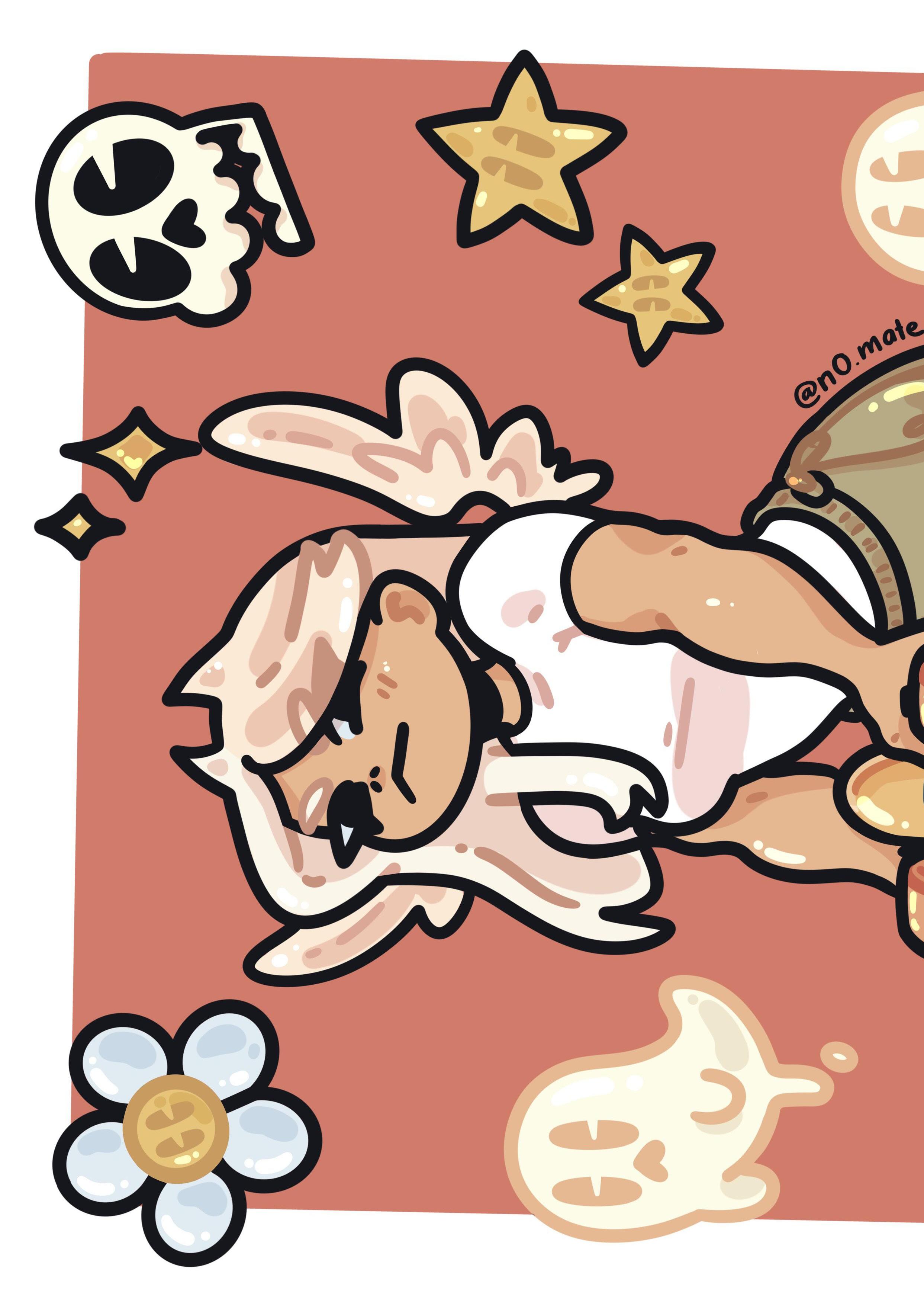
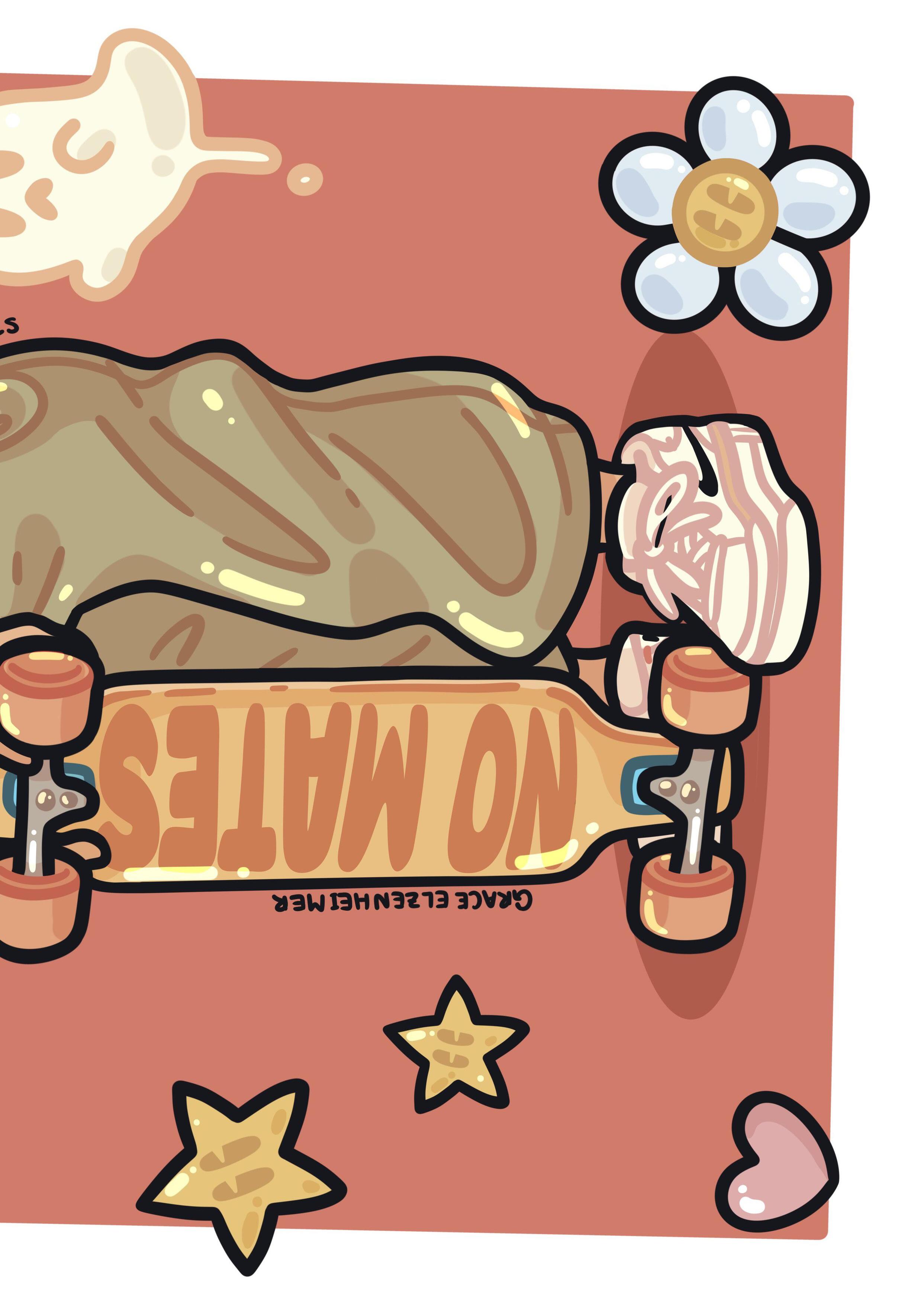
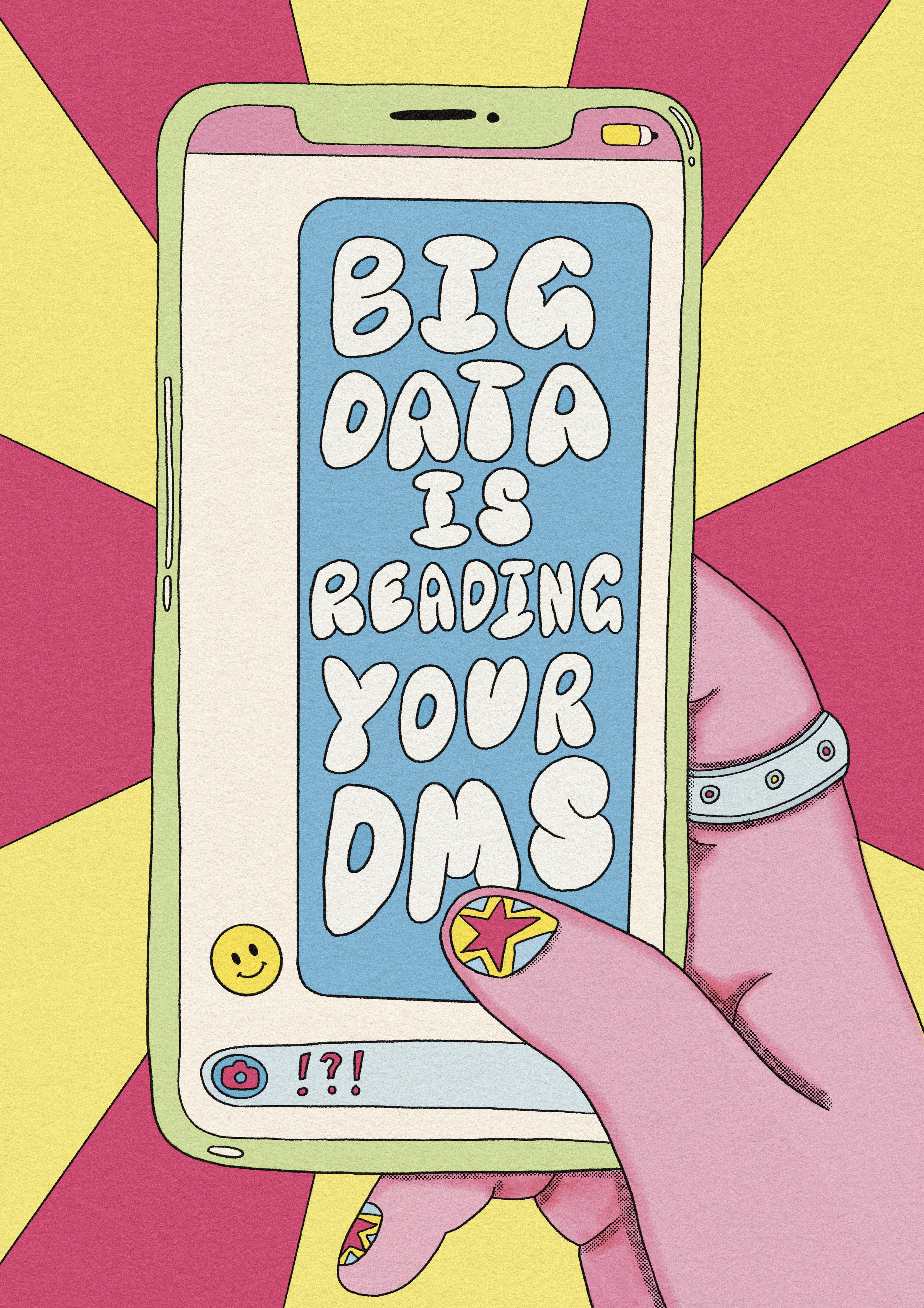 Words by Tory Alberts (they/them)
Words by Tory Alberts (they/them)
Imagine cameras watching you constantly. How comfortable would you be with omnipresent monitoring, and not just by Big Brother?
What if anyone could connect to the cameras and watch you? That’s what Big Data’s access to you allows. Everything is tracked and sold: from your age, gender identity, search history, locations, mood, Countdown purchases—the list, quite literally, never ends! Your phone shares the locations where you live and work, your Fitbit knows when you have sex and how long you last, and your smart fridge knows your credit card number.
You wouldn’t steal a fridge, but you can hack it.
Shout out to people sharing their Snapchat locations, you’re making a potential attacker not really have to try…
In this age of data hoarding, we’re mainly tracked by these things called cookies and pixels. We’ve all heard of cookies and their annoying pop ups, but do you know what they are? They’re basically a ‘tool’ that remembers all of your website interactions, like what’s in your shopping cart. Pixels are used mostly by social media platforms like TikTok and Meta. They monitor where you've been and when you were there. They then link you and your online activities, and use that information to personalise your ads. If you’re working from home in the comfort of your pyjamas, there are data services that can show your boss if you have opened emails. This is the same tech hackers use if you open spams.
These info hoarders are often careless with how they store our data, making breaches and hacking an unfortunate inevitability. Back in 2015, Ashley Madison—a dating site made specially for cheaters—was hacked, exposing 32 million users' info. Sometimes the infrastructure of the internet allows for attacks that are an invasion of privacy despite the action being completely legal. The BDSM website FetLife allows users to find other users with filters of age, gender, and location. They had a ‘breach’ when a user realised they could exploit the site and post a list of the young women in their area, including their names, locations, and pictures.
Whether it’s a breach or an exploitation of a service, you can be hurt when the internet has no central point of control; no one place where everything can be checked. All breached data brings the possibility of your passwords, full name, email, or even messages and photos being leaked. The aftermath of these breaches have distressing outcomes like blackmail and identity theft. This hoarding is often needless, yet it creates a huge risk for every user unlucky enough to use any particular online service.
Companies will continue to choose profit over privacy until data stops being profitable. Offering the wealthy unrestrained access to our data gives corporations power to shape
our realities. This might not be your biggest concern when it concerns your habits or personalised ads, but what about when it impacts democracy? In 2016, controversial consulting firm Cambridge Analytica gathered thousands of data points on two million voters in the USA, as well as other countries. They went through seemingly harmless extensions, such as calculators and calendars, to access a user’s Facebook session cookies. These cookies allowed Cambridge Analytica to log into Facebook as if they were that user. They experimented with showing different kinds of political ads to users, and changed the election’s outcome by 4% by showing ads that encouraged users to vote.
We live in a world where our reality is shaped by what is shown to us by our screens, and each TikTok and YouTube feed is showing a completely distorted and personalised world. Democracy works when everyone has the same information and perception of the world. If what we're exposed to is completely different to those around us, ‘harmony’ becomes elusive and the very concept of truth becomes a distant memory.
We have to choose between privacy or convenience.
Sacrificing some privacy for a tool can feel like a balanced trade, but companies, the government, and hackers are going to take advantage of your decision. The internet and current tech products give us the opportunity to pay to give them our data. Amazon products in general have a habit of harvesting you for all you’re worth: Alexa records you constantly, the latest Roombas map out your floor plan, and, without a warrant, Amazon has provided police in America with footage provided by their Ring door cams (11 times this year so far).
Spotify might seem like a harmless app, but some banks have begun using its predictions of your mood in assessing whether you’ll be approved for a loan. With DNA heritage tests, you’re paying to give away genetic data, and it’s led to unintended consequences like deportation and denied insurance. Depending on what app you’re using, your messages are not just stored forever but can be given directly to the police with no notice. Discord, the home of our country’s proudest drug servers, might not be as sneaky as you think. Companies can also trade your data without consent when they feel like it. Meta gave Spotify and Netflix complete access to users’ chats in exchange for data to help their ‘People You May Know’ algorithm: a feature that connects people with their employers, exes, and even stalkers.
It’s important to remember when it comes to social media and apps in general that if something is free, then you are the product. These companies cannot be trusted to keep you or your data safe. With an everincreasing amount of cyber attacks, the key is to collect less and protect more, not the opposite.
23 Influence & Media ✦ 04 ✦ FEATURES ✦ AHUATANGA
Selling personal data should not be normalised. Profiting off people’s highly sensitive information should not be normal. Having to go out of your way to opt out of being tracked everywhere you go isn’t fair to people’s autonomy. Only now are we beginning to pay attention to privacy rights and concerns. Yet placing the burden solely on each user can be easily undermined by someone close to you who didn’t realise they were at risk. Pay attention to companies who care about your privacy. Our opinions, and our dissent, can push change.
So, what the fuck are we supposed to do?
First, we need to band together to complain and demand better.
Use services with privacy in mind
• Internet browsers such as DuckDuckGo, Brave, and Firefox block third-party trackers and cookies. Even on incognito, Chrome lets the websites you visit track you through your IP, it just doesn't store anything on your phone.
• Sticking with your current browser? Install some privacy extensions and delete all extensions that you don’t know to be safe..
Messaging: use Signal, the perfect app for sending nudes, buying drugs, and snitching on your company's unethical practices to the media.
• Use a password manager and use strong passwords.
Apps
• Don’t keep any apps you don’t need—your phone’s security is only as strong as your weakest app.
• Delete apps known to mess with your head, put you in an echo-chamber, and steal your data (e.g. TikTok and anything Meta).
Hide your data
Post less and post smarter: consider how something could be used against you. Don’t buy Roombas, DNA tests, smart fridges, or Alexas. Anything that connects to the internet can be hacked if it’s not already giving away your data.
• Don’t allow camera, location, or voice access unless the circumstances are 100% trusted and necessary (please turn off your Snap Maps, I’m begging you).
Lie
Make the false internet persona of your dreams.
• Depending on the site and the purpose, it’s a good idea to lie about your age, DOB, name, or your address of any kind. Use burner emails like Guerrilla Mail, or make an email with no information linked to you.
• Check what info you’ve already outed about yourself on active accounts. Remove or update any personal details you don't want to share.
Stand up for other people
• Ask for consent when posting pictures of other people. Also, a quick message for whoever’s running @nzstyled: stop posting all these people without consent and find a new way to get views.
Don’t cyber hoard!
• Less data kept = less risk. If you think you might need something in the future, create a backup of the data you have online, store it on an encrypted hard drive, and delete it from the internet.
• Unsubscribe from emails. If you're getting emails you don't want, unsubscribe from newsletters or mailing lists. Clear browser data. Regularly clear your browsing history, cookies, and cache. This helps reduce the amount of data collected about you while browsing.
Be aware what others can find out about you
Think about all the different accounts you’ve had and how many of them are publicly viewable (Instagram, Reddit, DeviantArt). You’ve undoubtedly forgotten multiple, so think of all the usernames you’ve used and search for them on google. Using quotes, search for your username (cool_guy) and your full name (Cool Guy Smith) to see what someone else could find about you.
• Have a particular un-employer-friendly pic of you out there? Reverse image search to see where it’s turning up and give you a start on getting it back.
• You might not want to waste time pretending to be a techie, so if you’re worried with reason and have the means, you can just pay. Find a service that employers use and have a third party find your dirt for you.
There is going to be a lot of information available on you already. What’s important now is staying vigilant on the ways your data is being taken, knowing what you can and can’t change, and doing as much as you can to keep your private life private. Don’t put yourself in an awkward position you don’t need to be in.
24 ✦ Influence & Media 04 ✦ FEATURES ✦ AHUATANGA
&


If you, your club or someone you know has had some great achievement, nominate them for an award!


Nominations are open now!


25 Influence & Media ✦
vuwsa.org.nz/gold-awards
noon,
September.
Apply at
by 12pm
Thursday 21
For more information email golds@vuwsa.org.nz
Supreme Club
Gold Awards Recognising outstanding contributions across cultural activities & clubs
Fandoms , Fraud, & Failure
How the World’s Worst Social Media Convention Forever Changed the Internet
Words by Tom Vincent (he/him)
The year is 2014 and the internet is like a foreign country.
One Direction fanfiction is booming on Wattpad and Archive of Our Own, Twitter and Tumblr are gold mines for Sherlock cosplays, and on YouTube, the ice bucket challenge is inescapable. Everywhere you look, social media is brimming with fandom culture and quirkiness. Weirdness is encouraged and cringe culture as we know it does not exist.

Fast forward nine years and the internet is a bitter, jaded place. We are meant to be our real, day-to-day selves (BeReal, anyone?), we conform to stricter standards of presentability, and strange interests are ostracised as 'cringe'. Go watch an old Vine compilation and then open up TikTok—you’ll see a difference. When did we start sanitising our behaviour on social media?
In a word: DashCon.
Originally titled ‘Tumbl-Con’ but renamed for copyright reasons, DashCon was the first—and last—Tumblr convention. Made “for Tumblr fans, by Tumblr fans”, the 2014 convention was intended to be a wholesome celebration of the website, welcoming those with niche interests and bringing the community together. Instead, it was destined to go down in history as one of the worst internet disasters of all time, with far-reaching consequences for what it meant to be a social media user.
DashCon was devised in 2013 by a handful of young and inexperienced internet devotees, none of whom were
actually affiliated with the Tumblr brand. Still, the organisers claimed to be partnered with the charity ‘Random Acts’ (later revealed to be a lie), which at the time gave them some degree of credibility.
Over the next year, they raised money for the event through an Indiegogo campaign, a raffle, and by selling general admission tickets. Robotic pantomime band Steam Powered Giraffe and the cast from horror podcast Welcome to Night Vale were scheduled to perform, both of which were pretty high-profile at the time. In true 2013 quirkiness, the organisers even promised a massive ball pit for the guests, and people were unironically hyped.
The venue was booked. The date was set. What could possibly go wrong?
Day One .
The Renaissance Schaumburg Hotel and Convention Centre in Chicago, USA opened its doors on Friday, 11 June 2014 to flocks of excited fans. DashCon’s official schedule promised panels such as ‘Hay There Brony!’, ‘Westeros Is Where It’s At’ and ‘British Men With… Cheekbones’, but the majority of these would end up not taking place.
Things were off to a bad start when the guests couldn’t connect to the Wi-Fi. Minors were allegedly getting into 18+ NSFW panels. The ‘gaming room’ had a single gaming console and TV intended for 3000 guests. It surfaced that Steam Powered Giraffe weren’t even planning on attending.
26 ✦ Influence & Media 04 ✦ FEATURES ✦ AHUATANGA
The legendary ball pit turned out to be a literal kiddie pool filled with plastic balls that could fit maybe four people at once. Photos circulated across Twitter of the half-deflated pool sagging and wobbling like a pathetic, washed-up jellyfish.
“I went to a Taco Bell. I got some chips and nacho cheese. I came back and I found the ball pit,” said DashCon employee Lochlan O’Neil, who was 17 at the time. “You know how sometimes you feel like you’re in a dream? It was this, but it was horrifying. A nightmare. And I just kind of sat in it and ate my cheese.”
Over the course of the weekend, the ball pit would reach internet fame with at least one person pissing in it. There were also rumours that someone gave birth in the ball pit (obviously untrue but slay), and every June since, Tumblr users send birthday greetings to the ‘ball pit baby’.

Behind the scenes, things were worse.
Of the three main organisers of DashCon— Roxanne Schwieterman, Megg Eli, and Cain Hopkins— the latter two would put in minimal effort over the weekend, forcing Schwieterman to basically run the convention singlehandedly. Eli and Hopkins were grown adults in their 30s. Schwieterman was 19 years old.
While Schwieterman desperately worked damage control, Eli and Hopkins would get drunk in their hotel room and sleep in until noon every day of the convention. According to multiple accounts, they ignored Schwieterman’s calls and emails, and repeatedly made catty remarks about her (again, a literal teenager). Security didn’t even recognise the pair because of how rarely they were actually there.
This was all petty drama compared to the real organisational dilemma. The DashCon organisers had anticipated a minimum of 3000 guests to turn up. On Day One, they got… 350.
The convention’s team claimed to have negotiated a verbal agreement with the hotel, planning to pay them gradually throughout the three-day convention via ticket sales instead of giving an upfront payment. Given the pisspoor attendance, the Renaissance clearly realised that they weren’t going to get their money. Late in the day, a staff member of the hotel told the DashCon team that they needed to cough up US$17,000 or the Renaissance would shut the event down. Immediately.
In case you were wondering, $17k is enough to get yourself a BSc at VUW and still have enough money left to buy 968 cans of V from the Kelburn vending machines (which you’d probably need to get yourself through the BSc).
DashCon was fucked. At 9 p.m, the organisers gathered all the guests in a room and broke the news: they needed to crowdfund $17k. They had one hour.
Horror spread across the internet like wildfire. Allegations of extortion and scamming were hurled at the organisers. A suspicious-looking donation bag was passed around the room, along with bizarre footage of the DashCon team giving the Hunger Games salute to the crowd.
Lochlan O’Neil, who had finished her cheese by now, was forced to hold the donation bag because she was “crying the most”. Ah, to be 17 again.
Some iconic quotes from the crowd (documented by @chiathingy) include “I hate the staff, hoW COULD THEY DO THIS TO US” and “I’m not crying, I was JUST IN THE POOL.” My personal favourite is “tweet mark ruffalo.”
Mark Ruffalo unfortunately did not intervene, but the rest of the internet did, banding together via PayPal donations and raising the $17k. Miraculously, the con (in every sense of the word) was allowed to continue.
27 Influence & Media ✦ 04 ✦ FEATURES ✦ AHUATANGA
Oops.
Day Two .
DashCon organisers ditched all the panellists whose hotel rooms they’d promised to pay for (no money, remember?), and it was revealed that the official DashCon artwork was stolen copyrighted material. Many vendors left because their potential customers had just given away all their disposable income, and stressed teenage volunteers who were promised free meals went hungry. Pacific Rim was played illegally to a tiny audience. Free hotel mints were given as prizes (again, no money!).
The cherry on the cake of incompetence was the main event pulling out. Understandably, Welcome to Night Vale refused to perform without being paid in advance. When DashCon said no, they walked.
While fans sat in the room waiting for WTNV to perform, the DashCon team edited their website to a ‘no refunds’ policy, before telling the guests the great news one hour after the performance was meant to start.
Those who paid extra to see WTNV were “reimbursed” with raffle tickets and allowed to have “an extra hour in the ball pit”.
Playing in the ball pit was not timed, so “an extra hour” was meaningless and utterly nonsensical. As a result, “an extra hour in the ball pit” quickly became a meme, and was delightfully mocked by everyone who wasn’t at the convention.
After the WTNV flop, panellists dropped out like they were evacuating a nuclear accident. ND Stevenson, non-binary icon and creator of She-Ra and the Princesses of Power, had to sleep on a couch offered to him by the WTNV cast because no one would let him into his actual hotel room.
Schwieterman tweeted a picture of herself crying on the official DashCon Twitter, and thus ended Day Two.
On Sunday, 13 June, the DashCon team held an official apology panel, promising there would be another convention in 2015 which would be “even better”.
Looking back on DashCon 2014, multiple commentators have noticed that the convention’s finances don’t add up, to say nothing of Hopkins’ extensive history of lying and scamming (fun fact, he claimed his birth name was Loki).
Was the whole convention a scam? No. Was there at least some dubious financial activity? Well… maybe.
Regardless of the ratio of wilful incompetence to questionable fiscal decisions, the outcome was the same. Social media had been forever tainted.
In the wake of the con, Tumblr was hit the hardest. For many users, DashCon deflated their image of the website. The label “hellsite” was slapped all over the platform, including by Tumblr staff, and the relevance of the site plummeted. It didn’t feel like an idyllic haven for fan culture and misfits anymore. It felt like a pissy ball pit.
Similar sentiments spread across Twitter and Reddit: disillusionment with fan-oriented social media and embarrassment at being part of such a community. Bit by bit, the post-DashCon internet became increasingly more cynical, and quirky online interests started to be seen as cringe. Although DashCon wasn’t the only factor that shifted our social media habits in the mid-to-late 2010s, it was one of the most important. The age of ‘lol so random xD’ was dead, and the internet transformed into just another extension of our mundane everyday lives.
So, next time that you’re navigating social media in 2023, trying to avoid the middle school nepo babies on TikTok or the neo-Nazis sucking off Musk on Twitter, remember that it could be worse.
You could have been given an extra hour in the ball pit.
28 ✦ Influence & Media 04 ✦ FEATURES ✦ AHUATANGA
ODCASTS
Rolling the Dice on a New Podcast
Words by Alex Marinkovich-Josey (he/him)
Wait, Roll That Again! is a tabletop role-playing game design podcast that takes you through your first steps to building a game alongside Alex, a brand new game designer. You'll hear from leading, award winning, and vastly experienced designers as they help Alex get a better idea of how to make a game, from the basic idea all the way through to publication.
This year, I set out to work on a new podcasting project, hoping to combine my love for tabletop games and narrative podcasting.

Narrative podcasts follow a story from start to finish. For example, true crime podcast, or one of my favourite shows, Mission ImPASTAble: one man’s journey to create his very own pasta shape. One of the characteristics of a narrative show that separates it from other formats is the use of narration, connecting interview content and other elements to pull the story together. I had my practice working in this style with Salient this year, when we covered the university cuts as they were announced on The Salient Unedited Session podcast.
I’ve played tabletop games like Dungeons and Dragon's since I was in high school. The podcast space for tabletop gaming is dominated by actual play podcasts: shows that follow a group’s game play through. Not immediately hooked by that idea, I wanted to do something different with this project. I was interested in the background of these games. I wondered what it would take to create one…
Designing tabletop games seemed to be an art that eluded me, but my curiosity led me to connecting with Kēmu Whakatau O Aotearoa, or KiwiRPG. The collective’s website states that they’re a collective of “Aotearoa’s TTRPG podcasters, live streamers, YouTubers, and game
designers” coming together to spotlight the work made here locally in Aotearoa. By connecting with the group, I learned a little bit more about their process and I was hit with a sudden spark of inspiration!
During the annual KiwiRPG week event in June, the first episode of my show, Wait, Roll That Again! was released. The show’s format follows me as I try to design my first ever tabletop game. I speak with experienced designers from Aotearoa and internationally about their own game design, the steps they take to get their games out there, and their key takeaways from their years of experience. I also work with the players in my usual tabletop gaming group to figure out mechanics for the game and help me with play testing, running development versions of the game, and give me critical feedback on what is and isn’t working.

In the first episode, I speak to Welly-based designer Morgan Davie. He tells me game design is like “chasing a rainbow, and you’re never gonna quite get to it, but you can see it’s out there! You want to try grab on to a theme and play around with it, that’s game design.” With his help, I eventually found a rainbow for myself, and I kept going.
Speaking to designers like Monster of The Week’s Michael Sands, and Wanderhome’s Jay Dragon, with Wait, Roll That Again I’m able to give listeners insights into the behind the scenes of the tabletop design world from some of gaming’s greatest designers working today.
Some of my favourite podcasts are narrative shows. They combine the best elements of investigative journalism, documentary style, and creative story-telling that brings their listeners along for the journey. With this project, I’ve pushed my own skill set further than ever before. I’ve made plenty of mistakes, including audio fuck-ups and production delays, but now I know now what I’ll do differently next time.
29 Influence & Media ✦ 05 ✦ PODCASTS ✦ KŌNAE IPURANGI
Dear Aunty Vic
I've been going on a date with a new guy every week in Wellington, but I haven't connected with any of them. They’re all disappointing? I'm considering giving up on dating altogether.

Goodness ever gracious me. If dates are just constantly disappointing you, why the hell are you putting yourself through it? Everyone knows being single is way less stressful.
First, I want to give you some kudos for actually finding a new person to date every week. Are you using Hinge? You must be. I don’t even know enough men for that to be physically possible. Engaging in frequent small talk, wearing a constant smile, and casually paying for a $12 glass of wine every Friday isn't a commitment that every student is ready to undertake. Your social battery is either elite or you’re beyond drained.
The reason I say give up on dating is because it evidently isn’t serving you.
Dating can be an fulfilling experience if you enjoy a quick snog and spending your Friday nights learning new things about new people. However, if you’re looking to find a long-term partner, it’s rare that a Tinder date is going to provide.
Matching with strangers on Hinge is fun, but there’s no guarantee that you’ll be paired up with people who have the same energy, interests, or even ethos as you. The only thing guaranteed is that you’re both physically attracted to one another and capable of a bit of online banter. I mean, that’s definitely enough for some. But it’s not really a guarantee of life-long friendship, deep rooted trust, and amazing sex, is it?
A .A long-term partner always comes along when you least expect it. So dawdling around at the same bar every weekend isn’t going to get you there… A healthy, exciting, and loving relationship is more likely to appear when you are doing things you love, with people you love, and when you feel secure in who you are. I know that’s cliché, but it’s true.
You attract the energy you exude. Use this time while you’re single to grow your self confidence and learn what you really want and need. If these dates consistently lead to disappointment, spend time doing things that make you feel good with your friends instead. Channel that energy into self-care and personal growth, and revitalise yourself.

If you're dating to just get a few more names on the roster, it's time to step up your game. Don't settle for lame fucking activities like mini golf. Instead, take a bold approach. Send that text message. You are young and sexy, and any person would be lucky to have an opportunity to even be in your presence!
Remember, being single is a thrilling journey of selfdiscovery, but it won't feel that way if you're just waiting around for the excitement to come to you. While dating can bring disappointment, it also presents a golden chance to fulfil your desires on your own terms. Infusing boldness into your weekly dates adds excitement to life. Your dating experiences will be lacklustre if you're stuck in the same routine, maintaining the same attitude, and simply hoping for someone to sweep you off your feet.
Aim to be the person your date can't stop raving about to their friends. Strive to create the best dating experiences they've ever had. You get what you give, so if you want your Fridays to be more spicy, you need to bring the heat.
30 ✦ Influence & Media
06 ✦ COLUMNS ✦ TIWAE
Send your anonymous questions to Aunty Vic via the Salient Linktree.
Q.
Māori Representation in Media: Why it Matters, and What it Should Look Like
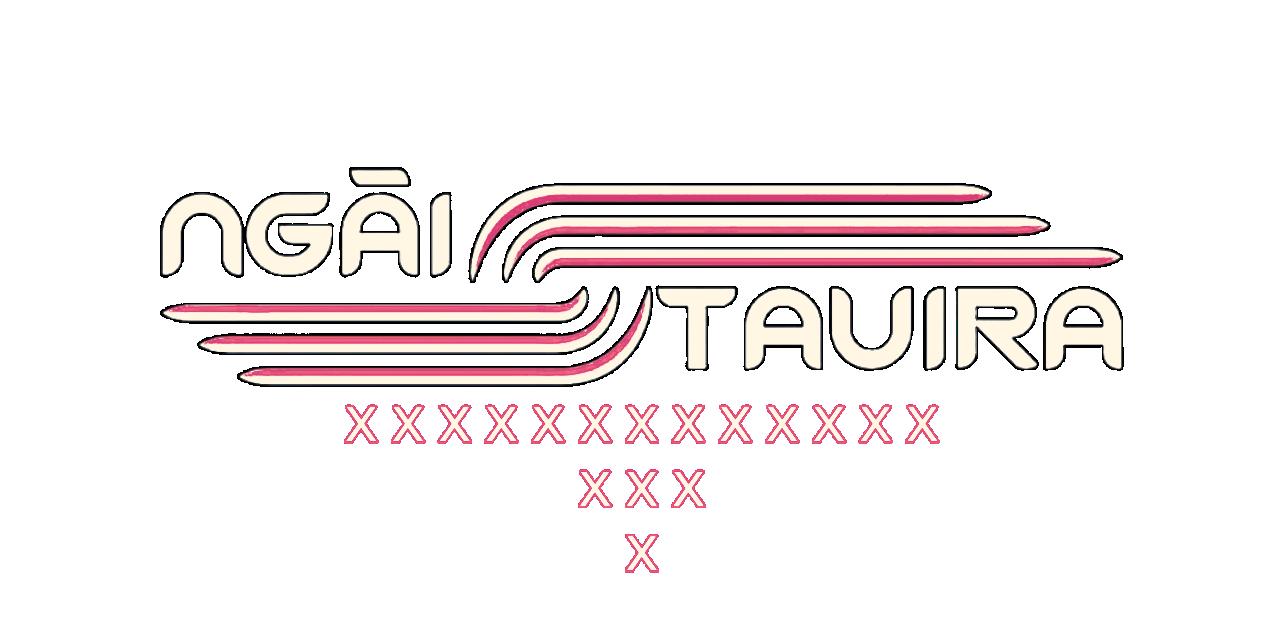
Media is everywhere nowadays, whether we want to see it or not. It’s wild to fathom just how prevalent media is in the life of a university student, and the forms of media are as boundaryless as the topics and discussions. Or, as Paddy Gower would say, “This is the fuckin’ news!”
When it comes to Māori representation in the media, I won’t blame you if the narratives of Boy, Once Were Warriors and Police Ten 7 come to mind. All jokes aside, Māori representation in media is essential, but it must be accurate Māori representation. Shows such as The Casketeers clarify misconceptions about our customs and serve to preserve our culture and promote it in a way that is tika. I love how Francis and Kaiora Tipene incorporate and educate a broader audience on Te Reo me ona Tikanga—Māori customary concepts and language—through their funeral business. The Casketeers is an educational tool for those who may not have direct exposure to Māori culture in a unique and entertaining way.
Without a doubt, the media has its depths, especially social platforms. Sometimes the worst of it isn’t the masked ‘keyboard warrior’ strangers, but some of our very own. I came across a video of a tane explaining how tall poppy syndrome is all too prevalent in New Zealand society. For those unfamiliar, tall poppy syndrome is an excuse to criticise success by comparing it to ‘bragging’, which is not to be confused with promoting humility. Sometimes, with such accessible means to connect and influence comes invasive slander. Take it from Shaneel Lal, who, of all people, has experienced the cruelty and rewards of social media: “It is easy to get lost in the hatred
[of Twitter] and forget all the positivity in the real world.” We can all resonate with this quote: our perspective is not limited to comment sections and Instagram stories, but action taken from inspiration.
Representation is what makes media influential. Remember when Oriini Kaipara made headlines as the first wahine Māori with a moko kauae to anchor a mainstream news outlet? Maybe your rents remember when Dame Hinewehi Mohi shocked the nation for singing the national anthem in Te Reo at the 1999 World Cup. It’s safe to say many were trying to cut down these tall poppies, but a wero had been laid. The challenge is how we can contribute to a broad goal of social inclusion (or decolonisation) while doing right by our tūpuna, iwi, hapū, and whānau. You could say trailblazers are willing to ‘block out the haters’.
As tangata whenua, we carry the mana of ourselves and others. When our people are portrayed as active participants in contemporary society, it conveys that our voices matter and our contributions are valued. Above all, when you see someone with the same background and appearance as you perfecting their craft and being recognised for it, you, and others, are empowered by it.
These leaders are physical manifestations of wāwata, showing how magical our people can be. Most of all, they remind us that the very things that may seem boring in our everyday lives were once the dreams of our tūpuna.
Nā reira, tēnā koutou, tēna koutou katoa. And if you’ll excuse me, our people are dreaming of when the Warriors will make a grand final.
31 Influence & Media ✦ 06 ✦ COLUMNS ✦ TIWAE
Words by Rīpeka Raihania (she/her; Ngāi Tāmanuhiri, Rongomaiwahine, Ngā Puhi, Te Aupōuri)
Autistic Representation: Atypical and Heartbreak High
Words by Teddi (they/he/she)
Autistic representation in the media is starting to become more normalised and we love to see it. Not all of it is great representation, but it is designed to strike a chord with viewers and help them to connect with the media.
Sam (played by Keir Gilchrist), the central character in Atypical, is autistic, and some of his traits are recognisable even to those who are neurotypical, such as the headphones Sam wears to soften noises. But, some of Sam’s actions show there was not a good understanding of autism by the writers and producers. Some of his behaviours weren’t autistic, they were abusive. At one point, Sam locks his girlfriend in a closet, and they both play it off as being fine since he is autistic.
Sam’s whole character is built around being autistic, rather than being a multifaceted person. The lives of his family are where most of the plot actually happens. Atypical has great LGBTQIA+ representation, with non-binary actor Brigette Lundy-Paine playing Sam’s sister, Casey, who leads her own queer coming-of-age storyline. Sam and Casey show that siblings are siblings, regardless of disability. But overall, Atypical is not what I reach for when I want to show people what good autistic representation is.
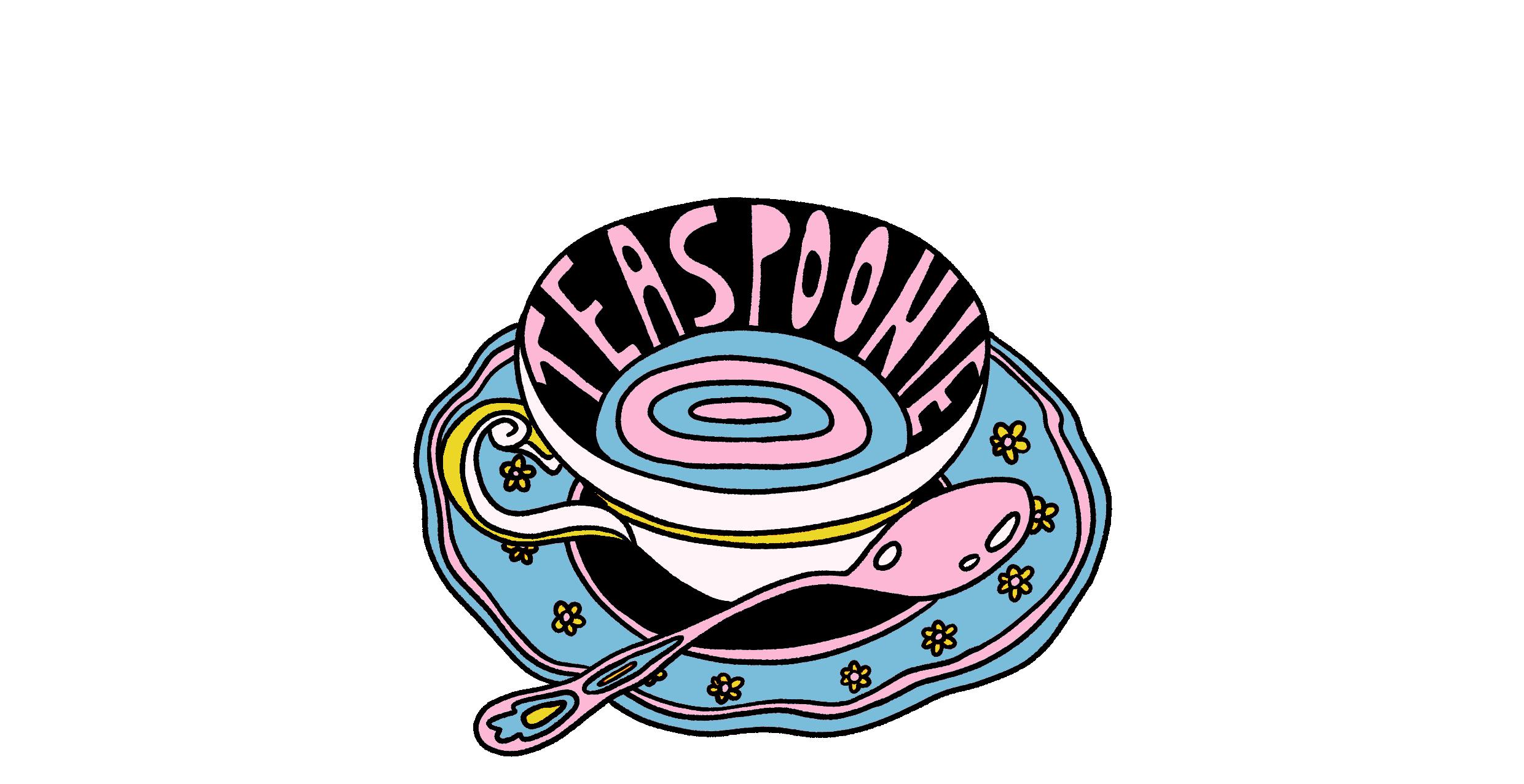
Where Atypical faltered in autism representation, Heartbreak High did their autistic character, Quinni (played by Chloé Hayden) justice. Chloé was very vocal about her input into Quinni’s character, and that the casting director specifically looked for an actor that was diagnosed with autism so they could create an accurate portrayal.
Quinni wasn’t introduced straight away as being autistic. It wasn’t hidden, but it wasn’t the only thing about her character that the audience needed to know to understand her. This contributed to visibility for people who live without a diagnosis: it doesn’t mean a person is any less autistic.
In her character’s focal episode, there were details I had never seen portrayed on TV before. Everyone who is autistic is their own person, and individual autism presents differently, so I had never really been bothered by the lack of representation. But when I saw someone that, like me, had a daily list for morning routine and full-day schedule, I nearly cried. I know my routine, yes, but checking it is part of the reliability of the routine. It made me feel like there are others out there that are the same as me. I’ve been mocked by many for little things that make my life easier, so to see I’m not alone in doing these things was really nice.
One thing that was groundbreaking in Heartbreak High was the visibility of mutism. Going non-verbal can be common for people with autism when overstimulated, tired, or triggered. Quinni’s dads and her friends had care and understanding when this happened. It really hit me hard when Quinni’s friends weren’t trying to force her to talk and respected her space, as someone who has dealt with the opposite of understanding when nonverbal. The characters close to her had a beautiful level of acceptance of Quinni, and they helped others around her learn to understand and let her be herself.
32 ✦ Influence & Media
06 ✦ COLUMNS ✦ TIWAE
Touch Grass
Touch Grass is an internet slogan aimed at people who seem like they spend too much time alone on their computer. It means ‘turn off your device for a moment and reconnect with the real world’.
I wholeheartedly support this message.
Obviously there are big health benefits to being outside: getting fresh air, exercise, and that good vitamin D. There’s something so healing about warm sunlight on your skin. But I want to talk about the social side of it.
This isn’t some ‘rah rah social media bad’ sort of thing. UniQ has an online presence, including a busy Discord server, but there’s no denying social media’s pervasive influence.
Within queer communities especially, the online world can often be a safe haven from hardships in the real world: an easy distraction to plug in to and find yourself a micro-community full of people from all across the world who cater to the same little niche.
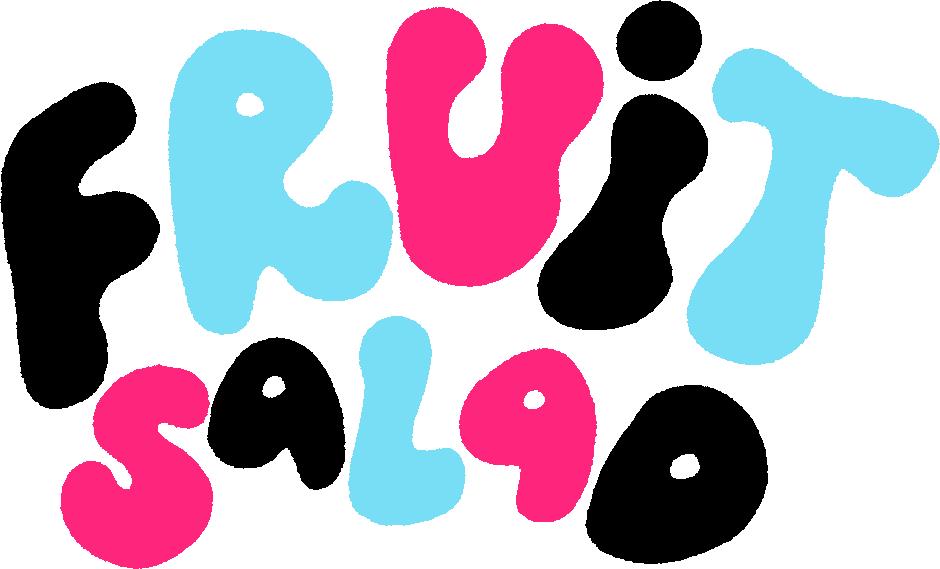
It’s a wonderful technology, granting us connection and community where it was previously so hard to find. But it was never supposed to replace real life. Despite what the folks at Meta may want you to believe, there is no substitute for human interaction.
Those beloved, welcoming micro-communities are just that: micro. They’re self-contained echo chambers where we form tribes and reinforce each other’s opinions. I’ve seen it even in our UniQ channels. There’s a lot of shouting into the void, only speaking to








people you agree with. Of course, good friendships can be made, but you don’t get real diversity or new ideas from these places where you’re all just avatars and walls of text.
Sunlight is great and all, but nothing is more important for our development than actual human interaction. So much of queer existence has historically relied on our ability to gather together. Meeting in bars and community halls, organising parades, concerts, rallies, riots—these are what our community was born from. Being in a real space with real people you can see and hear and can’t just scroll past if you want to ignore them. People different to you, people that may disagree with you, people that might have something to teach you. Queer people, our people.
UniQ has plenty of social spaces and in-person events throughout the year that fellow students are welcome to attend. If nightlife is what you’re after, Ivy Bar on Cuba Street is an easy one. They also host plenty of meet-ups and drag events. If you want to be part of something big, groups like InsideOut and Gender Minorities Aotearoa are great avenues to get involved in the community.
If quiet time with something to read is more your style, check out the Lesbian and Gay Archives of New Zealand (LAGANZ) for an incredible wealth of local queer history, or even the LGBTQ+ section of your local library (it exists). Get out there! And for the love of god, touch some grass.
33 Influence & Media ✦
Words by Goose (she/they)
06 ✦ COLUMNS ✦ TIWAE
Regrets
Words by Cadence Chung (she/they)
I should have looked at the Turners for hours instead of a polite few minutes, eaten alive by all that burnished light. I should have abstained from coffee. I should have abstained from all worldly pleasures and remained a Romantic little virgin, nothing but my own lips to bite. I should have loved more and always more but there's only so many love letters a girl can take — until they're peeling from between your fingers, paper-pulp ruins. I should have polished my shoes so they didn't squeak. I should have kissed her, one last time, before I left.
34 ✦ Influence & Media
07 ✦ CREATIVE SPACE ✦ AUHUA
Your life is great at the moment, but everybody else’s has devolved into chaos. Friends will be reaching out, and I implore you to not to give some ‘have you ever tried not being sad’ advice. Please remember empathy.
What’s that I see you scribbling in your diary? It can’t be… it is! Taurus, you’re a modern bard with all the love poetry you’ve written recently. Well, you know what? Your attempts to woo just might work.
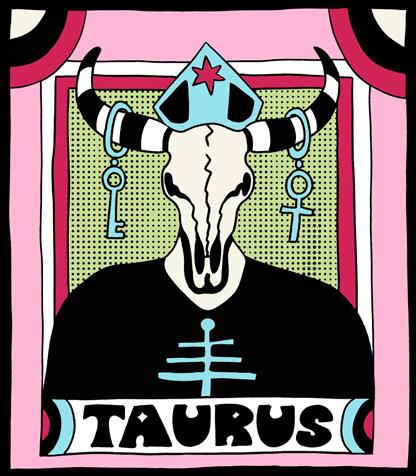

Get drunk with your mum and get her to spill all the tea. You’ll be having some healing conversations with family members this week. Expect closure on your parents’ divorce and the time mum sent your favourite shirt to the op shop.
There’s a message draft sitting in your Notes app. Friendship breakup vibes. Well, whatever they did, I’m on your side. Speak your truth, king. Don’t be afraid. Send that shit.
Leo is Sugar Daddy and Sugar Daddy is Leo. You’ve come into some big coin (well, shall we say subjectively big coin) and you’re spoiling everybody. You’re putting that recent birthday money to good use, I see.


I don’t even know how to write this one. It won’t all fit. The stars have so much for you and all of it is good. Like, prepare for a good ass week. Very proud of you, Virgo. You’ve come far from your typically bland horoscopes.
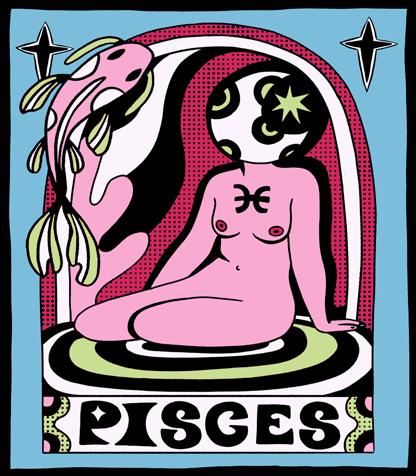

Venus has finally stationed direct. Thank fuck for that. You can stop freaking out and being confused over whether or not you have crushes on your friends or just like them as people. God, are you 12? Glad to give you clarity, at least.

Fuck, Scorpio, I’ve never seen you so ambitious. You have a dream and boyhowdy are you chasing it. Though, I get the feeling that there’s something, or someone you’re ignoring. What are you running from? Are you chasing, or being chased?

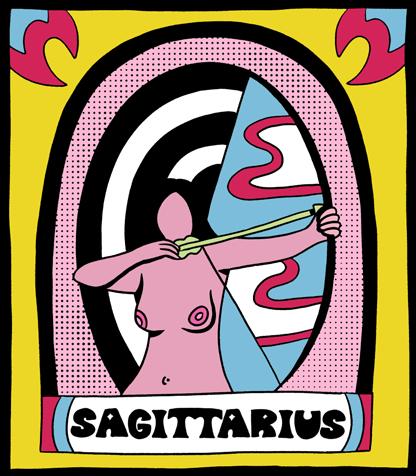

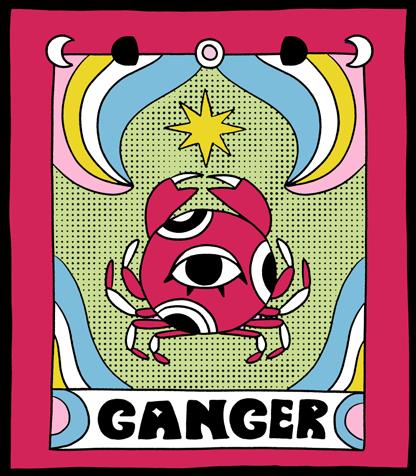
Are you going TikTok viral, Sag? Are you making good content? What side of the app are you on? Crochet? Cottagecore? Harry Potter? God, you’re not doing POVs are you? C’mon, don’t be shy. Drop the @.
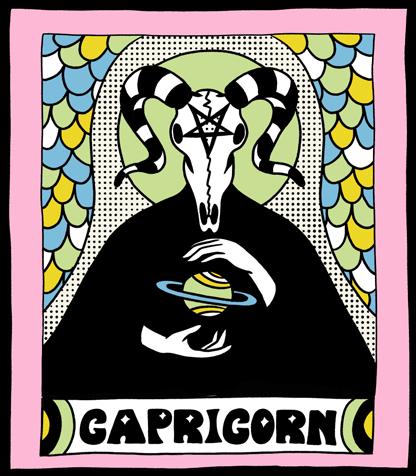
Ahhh, rough week for you. I wish I could give you some ice cream, but you don’t know me, and I don’t know you, so my hands are tied. Whatever you’re going through (probs a breakup) was a long time coming and you knew that, I’m afraid.
Goodness. How many confessions did you send into that Facebook page this week? Are you the person who slept with the racist RA? Or the one that keeps complaining about Salient’s fonts?
(Can you read this?)
You have the urge to move in with your significant other, don’t you? If you’re nearing your mid-20s, go for it! This is an exciting new chapter. If not, sit your ass back down on your parents’ couch and reassess your life choices.

35 Influence & Media ✦
35 Cupid ✦ Health & Disability
"I slept with my flatmate's boyfriend four weeks ago when we were drunk. I took a pregnancy test because I was a week and a half late on my period and it came back positive… I feel so bad, it was such a drunken mistake. We have been friends for 3 years and they have been dating for over a year. Her boyfriend and I have never been like this and we have kept our distance since. I don't know what to do!"

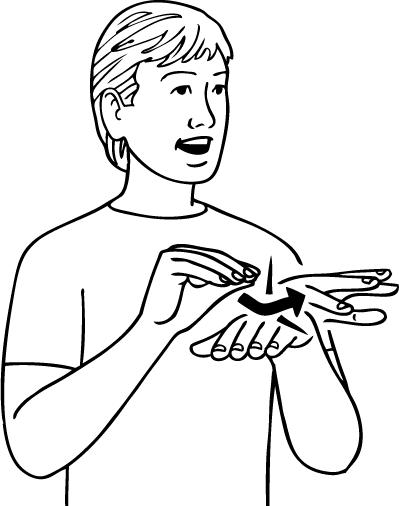
36 ✦ Influence & Media brain boozled 09 ✦ PUZZLES ✦ PANGA 31/08/2023, 11:09 Web Sudoku - Billions of Free Sudoku Puzzles to Play Online https://www 1/1 Easy Puzzle 5,842,960,230 Back to puzzle Print another Feedback 9 7 5 6 5 2 4 8 9 6 1 8 5 4 9 2 3 1 7 8 9 3 4 6 7 5 3 2 4 9 2 4 7 3 kawenga WORD OF THE WEEK: INFLUENCE NZ Sign Language SALIENT SURGEON
CONFESSIONS
-Anon
Hold Up
ACROSS
1. Warfare strategy that involves total destruction (8,5)
8. Gal Gadot or Natalie Portman, by birth (7)
9. Empire; monarch's land (5)
10. Cubist artist Pablo (7)
12. Top storey in some homes, often used for storage (5)
14. Sad; disappointing (8)
15. It's lower on the pH scale (4)
17. Rotate; opportunity to play (4)

18. Bouquets are their business (8)
20. Genre for 'Arrival' and 'Annihilation' (3-2)
21. Creature with a garden in a Beatles song (7)
23. Hemispherical snow hut (5)
24. National 'animal' of Scotland (7)
25. Only driver ever to have won the Indianapolis 500, the Daytona 500, and the Formula One World Championship (5,8)
DOWN
1. Cheap out on the essentials (5)
2. Yours and mine (3)
3. It comes with sixteen pawns (5,3)
4. You'll find it at the start of this Salient issue (9,6) *
5. Substance that lines a canal (but not the Suez) (3,3)
6. Two, in te reo (3)
7. Murders, in police-speak (9)
11. Very hungry creature in a children's book (11) *
13. You might call them after a crash (4,7) *
14. K on the periodic table (9)
16. Having more foam (8)
19. Japanese garments such as yukata and iromuji (6)
22. Toksvig of 'QI' and 'The Great British Bake Off' (5)
37 Influence & Media ✦
Find our crossword answers on our website or the Salient Linktree. 09 ✦ PUZZLES ✦ PANGA
38 ✦ Influence & Media 10 ✦ CREATIVE SPACE ✦ AUHUA For nominations and election info, head online to: vuwsa.org.nz/vuwsa-elections Want to know more about VUWSA, the Student Exec and the upcoming election? Then come have a yarn with past Exec about all things VUWSA! VUWSA Exec Nominations open 28th Aug - 11th Sept 11AM TUE 5TH SEPT THE HUB, KELBURN
THE TEAM
CO-EDITOR
CO-EDITOR
DESIGNER
PODCAST
PODCAST
NEWS EDITOR
CHIEF REPORTER
SUB-EDITOR
POETRY EDITOR

EDITORIAL SUPPORT
SOCIAL

STAFF WRITER
STAFF WRITER
STAFF WRITER



CONTRIBUTORS
Zoe Hollier (she/her)








@kathyjcuisine (hall/food)
Billie Angus (they/she)
Tory Alberts (they/them)
Tom Vincent (he/him)


Ella Hoogerbrug (she/her)


Rīpeka Raihania (she/her)
Goose (she/they)
Teddi (they/he/she)
Puck (cross/word)
Cadence Chung (she/they)

NEWS
WRITING
Grace
39 Influence & Media ✦
Francesca Pietkiewicz (she/they)
Maia Ingoe (she/her)
Bella Maresca (they/them) @cupids.kiss
✦ NGĀ MIHI ✦
Willem Koller (he/they)
VIDEO CONTENT CREATOR Seren Ashmore (he/him)
MEDIA MANAGER
Ethan Manera (he/him)
NEWS EDITOR Zoë Mills (they/she)
Niamh Vaughan (she/her)
Maia Armistead (she/her)
Tessa Keenan (she/her)
Joanna Fan (she/her)
Phoebe Robertson (she/her)
Kiran Patel (he/they)
Pippi Jean (she/her)
Alex Marinkovich-Josey (he/him)
MANAGER Simoné Botha (she/they)
INTERN
Ethan Rogacion (he/him)
INTERN Jia Sharma (she/her)
INTERN
CENTREFOLD ARTIST
Elzenheimer @n0.mates
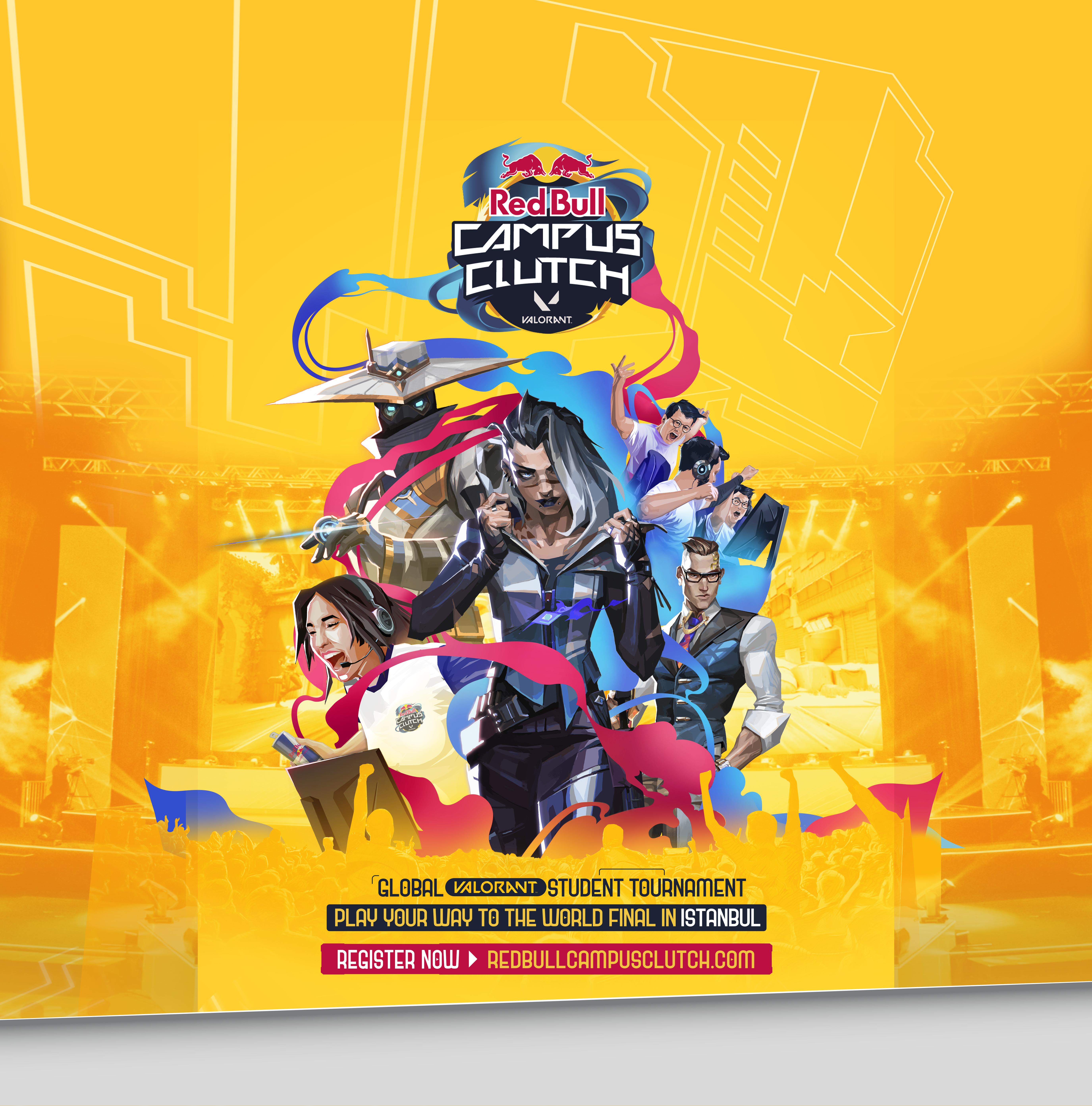







 Words by Ethan Manera (he/him)
Words by Ethan Manera (he/him)



 Words by Niamh Vaughan (she/her)
Words by Niamh Vaughan (she/her)






 Words by Ethan Manera (he/him)
Words by Ethan Manera (he/him)














 Words by Tory Alberts (they/them)
Words by Tory Alberts (they/them)

























































